- Prospective Students
- Current Students
- Faculty / Staff
- Make a Gift

- How Online Learning Works
- Academic Programs
- Why Ball State Online
- Services for Online Students
- Costs and Paying for College

Ball State University
- PhD in Special Education
- Colleges and Departments
- Ball State Online
- Doctoral & Specialist Degrees
- Teachers College

A doctoral degree in special education will prepare you to serve in an exciting career in which you can lead the educational or behavioral professions through administration, scholarship, and entrepreneurship—from teacher educator to special education manager to curriculum specialist to director of a treatment center.
This program is 100 percent online.
Our Philosophy
Program Goals
- Focus on core knowledge and skills for advanced professional practice.
- Provide flexibility for candidates to develop specialized expertise in focused areas of study that are critical to the field.
- Emphasize scholarship as a means of closing the gap between research and practice.
- Provide training on evidence-based education and practice.
- Build on the strength and collaboration of faculty within the department and other departments. Solving problems requires creative and united commitment.
- Emphasize learning in the context of communities as a means of producing socially meaningful improvements in the lives of individuals with disabilities.
- Offer courses entirely online.
Focused Areas of Doctoral Study
Graduates of the program earn their doctorates with an emphasis on one or more focus areas:
Doctoral students seeking training in American Sign Language (ASL) and deaf studies will prepare students with an understanding of the language as well as the culture. You’ll learn how to communicate in ASL, interact with deaf individuals, learn about the history of deaf culture, and how to collaborate with families and professionals.
The cognate will primarily focus on related fields within special education, Teachers College, or speech and audiology so that students have more systematic programming around deaf studies and ASL.
Doctoral students seeking training in applied behavior analysis and autism will learn to apply the principles and theories of applied behavior analysis to support individuals with disabilities in making socially important improvements in their quality of life. This focused area of study provides an emphasis in applying behavioral strategies to increase important life skills and/or decrease problem behaviors that interfere with opportunities in schools and communities.
Understanding principles of behavior, developing behavior consultation techniques, establishing organizational structures supporting skills acquisition and behavior change, and learning evidence-based treatment/intervention strategies are core concepts of this focused area of study.
Candidates have the opportunity to earn certifications in ABA and Autism from Ball State University as well as complete coursework required to become certified by the Behavior Analysis Certification Board.
Doctoral students seeking advanced training on serving low incidence populations will learn evidence-based strategies and instructional approaches that are used to teach persons with low incidence disabilities to acquire critical skills to increase their opportunities in their communities. This focused area of study provides an emphasis on severe disorders that impact learning and behavior.
Understanding principles of behavior, developing communication skills (including alternative and augmentative systems), making appropriate accommodations, and selecting treatment/intervention strategies when serving individuals with severe and moderate disabilities are key concepts of this focused area of study.
Candidates have the opportunity to expand their teaching repertoire as they work with learners with low incidence in special education settings. Teacher education preparation is also a focus of the program.
Doctoral students seeking advanced training on serving high incidence populations will learn evidence-based strategies and instructional approaches that are used to teach persons with high incidence disabilities to reach their full potential. This focused area of study provides an emphasis on commonly occurring disabilities that can be supported to help learners master educational materials.
Understanding principles of assessment, use of effective instructional methods, making appropriate accommodations, and selecting treatment/intervention strategies when serving individuals with mild disabilities are key concepts and skills of this focused area of study.
Candidates have the opportunity to expand their teaching repertoire as they work with learners with high incidence in special education settings. Teacher education preparation is also a focus of the program.
Doctoral students seeking training on serving students with emotional and behavioral disorders will learn evidence-based strategies and instructional approaches that are used to teach persons with emotional and behavioral disorders to develop skills that help their reach their full potential. This focused area of study provides an emphasis on commonly occurring emotional and behavioral disorders that can be supported to help learners master educational materials.
Understanding causes of emotional and behavioral disorders, principles of assessment, use of effective instructional methods, making appropriate accommodations, and selecting treatment/intervention strategies when serving individuals with emotional and behavioral disorders are key concepts and skills of this focused area of study.
Candidates have the opportunity to expand their teaching repertoire as they work with students who benefit from appropriate assessment and intervention in special education settings.
Doctoral students seeking training on Response to Intervention/Multi-Tier System of Supports will learn evidence-based strategies and instructional approaches that are used to develop systems within schools that have the goal of meeting the needs of all learners. This focused area of study provides an emphasis on creating systems that will establish the structure to enhance the performance of all students while simultaneously assessing and targeting specific educational and behavioral challenges as needed by individual learners.
Understanding causes the need to address professional development, the school culture and leadership as part of the solution needed to improve assessment, curriculum, and instruction are key concepts and skills of this focused area of study.
Candidates have the opportunity to expand their knowledge of creating supporting educational systems and their teaching repertoire as they work to support all students in reaching their highest potential.
Doctoral students seeking general special education training at the doctoral level typically assume leadership roles in special education in one or more of the following positions in higher education: teacher educator, special education manager, and curriculum specialist and researcher/evaluator.
Candidates who successfully complete the program will hold a doctor of education degree with a noncategorical major in special education degree, i.e., with generic training emphasis rather than a specific disabilities training emphasis.
Degree Requirements
The doctoral degree in special education consists of 91 graduate credits post-bachelor’s degrees. Typically, a maximum of 30 credits, earned towards the master's degree, may be applied to the total 91-credit requirement.
Additional credit requirements include:
- at least 40 credits, excluding dissertation credits, must be in the major (SPCE)
- at least 48 credits must be completed at Ball State University
- at least 10 dissertation credits (DISS 799)
Entering doctoral students select initial coursework in collaboration with the Director of the Doctoral Program. They then work with the chair of their doctoral committee to develop a comprehensive program of study. The full committee then adjusts or approves the program of study.
Doctoral students are expected to acquire research skills by taking a variety of coursework in research design and statistics. They complete a rigorous research component in which they demonstrate competency with research tools applicable to Special Education, Applied Behavior Analysis, and/or their Focused Area(s) of Study. Examples include but are not restricted to: Research Methods, Introduction to Statistical Methods, Analysis of Variance, Introduction to Qualitative Research, and Single Subject Research Design.
After admittance, doctoral students will complete coursework for a cognate in research methods. In addition, doctoral students work with their committee chairperson to select:
- a second cognate, of which you must complete nine credits at Ball State
- a second concentration within the department
- all doctoral students are strongly encouraged to complete a research cognate consisting of coursework recommended by the chair of their doctoral committee
You must complete at least 15 credits in two consecutive semesters beyond the master’s degree in order to meet our residency requirement. Residency will encourage you to:
- concentrate on coursework or research
- collaborate with faculty and other candidates
- develop specialized skills that support professional goals
At all times after completing nine credits of doctoral study, you must maintain a cumulative GPA of at least 3.2 for courses taken toward the doctoral degree.
Your cumulative GPA is reported and monitored as part of the Doctoral Program Decision Point Process within the Department of Special Education.
Near the end of your coursework, doctoral students take a comprehensive examination based on their coursework in Special Education and research as well as their focused area of study Graduate students will work with their doctoral committee to determine the coursework and other preparation needed to successfully prepare for the written and oral portions of the comprehensive examination.
Under the general supervision of your committee chairperson, doctoral students develop and receive approval on a dissertation topic. Dissertations for doctoral candidates in Special Education typically contribute to the solution of important problems in education and/or applied behavior analysis.
Using their knowledge of research methods and intensive examination of the literature regarding their dissertation topic, doctoral students write their dissertation proposal. Once approved by the chair of the doctoral committee, doctoral students distribute their work to the doctoral committee for review. The proposal meeting involves the doctoral student presenting their topic and proposed methodology. The doctoral committee recommends or requires changes prior to proposal approval. Subsequent to conducting their dissertation research, doctoral students complete their dissertation defense, in which doctoral students provide a presentation to committee members committee members, who then ask in-depth questions about the study and topic as well as its implications for the field.
For a complete list of required courses, see the course catalog.
View Catalog
Doctoral Committee
The Director of the Doctoral Program in Special Education meets with doctoral students when they are admitted to the program. Doctoral students are guided through the process of forming a doctoral committee, which begins with the selection of a chair for the doctoral committee. Doctoral students are encouraged to select chairs whose scholarly interests match topics they may wish to pursue with their dissertation.
Chairs of the doctoral committee will guide students in the selection of committee members—usually during the first year of doctoral study. Upon the recommendation of the departmental program director, the dean of the Graduate School will appoint the candidate’s committee.
Doctoral students will then consult with their committee to finalize a plan of study and guide the development of the dissertation. The plan of study will be filed in the departmental office and the Graduate School.
The committee will consist of either four or five voting members, depending on your program of study.
All committees will consist of:
- two members from the major (i.e., Special Education)
- an at-large member from a field or department not already represented
- a voting member for each cognate or focused area of study as identified on your program of study
Paying for Your Education
Tuition and Fees
Funding Graduate Study
Department graduate assistantships.
A graduate assistantship is an excellent opportunity to gain meaningful professional experience while helping cover the costs of your degree. Learn more.
Ready to Apply?
Are you interested in pursuing a PhD in Special Education? The first step is to apply as a graduate student to Ball State University. Begin the journey today.
Get Started
Students from Other States
Ball State is authorized by the U.S. Department of Education to accept online students from all U.S. states. However, if you are considering a program that leads to professional licensure, some states may have additional regulations. Review our state authorization website if you live outside of Indiana and contact us if you have questions.
More Information
Request Info Contact Director

Our Teachers College
As a student in Ball State's Teachers College, you will join a community that prepares tomorrow's professionals and leaders in all areas of education. Learn More
- Undergraduate Admissions
- Graduate Admissions
- Teacher Certification Options
- International Admissions Information
- Financial Aid & Scholarships
- Undergraduate Majors and Minors
- Master’s Programs
- Certificates of Advanced Study
- Doctoral Programs
- Online, Hybrid, and Flexible Programs
- Faculty and Academic Advising
- Career Services and Certification
- Undergraduate Peer Advisors
- Student Organizations
- Learning Communities
- For Families
- Study Abroad
- Field Placements & Internships
- Bridge to the City
- Spector/Warren Fellowship
- Orange Holmes Scholars
- Engaged BIPOC Scholar-Practitioner Program
- Research News
- Faculty Bookshelf
- Faculty Publications
- Grants & Awards
- Doctoral Dissertations
- Research Resources and Support
- Office of Professional Research and Development
- Atrocity Studies Annual Lecture
- Antiracist Algebra Coalition
- Ganders Lecture Series
- InquiryU@Solvay
- Intergroup Dialogue Program
- Otto’s Fall Reading Kickoff
- Psycho-Educational Teaching Laboratory
- The Study Council
- Writing Our Lives
- Center for Academic Achievement and Student Development
- Center on Disability and Inclusion
- Center for Experiential Pedagogy and Practice
- Latest News
- Upcoming Events
- Education Exchange
- Get Involved
- Advisory Board
- Tolley Medal
- Administration
- From the Dean
- Convocation
- Accreditation
- Request Info
- Grants & Awards
Special Education, Ph.D.
- Admissions & Financial Aid
- Requirements
The doctoral degree in special education examines critical issues in special and inclusive education, and prepares our graduates to become advocates and change agents for full inclusion in policy and academic settings.
Full tuition scholarships, competitive stipends, and tailored mentoring and cohort experiences available for Special Education Ph.D. applicants through Project IMMERSE .
This program invites expansive thinking on critical educational issues as well as in-depth study. You will select a concentration in either Inclusive Educational Studies or Disability Studies and Policy, and then work with faculty to engage in cutting edge research in inclusive education and policy. Opportunities are available for conducting in-service seminars and collaborating with faculty members in research, teaching, and grant writing.
Application Deadline: January 15 | More admissions information
Syracuse University has a long tradition of leadership in the field of special education and is recognized nationally and internationally. Syracuse was among the first universities to bring attention to the educational needs of students with disabilities and to effectively develop and refine assessment and educational strategies for diverse learners. Syracuse faculty and students continue this important legacy of promoting the rights of students with disabilities.
Expertise in teaching and instruction is also developed with the department and with participation in the Future Professoriate Program . This includes orientations, year-round services for teaching assistants, and opportunities to co-teach with fellow doctoral students and department faculty, guest lecture, and independent instruction.
Our graduates hold prestigious leadership positions in special education and related fields, including careers in higher education, as researchers, government/policy specialists, public and private agency/organization directors, program developers, or as special education consultants and advocates. The majority of our graduates secure tenure track faculty positions at colleges and universities.
I chose to pursue my Ph.D. in special education at Syracuse because as I was working in schools around the country, I saw a real lack of understanding from teachers of what research and best practice say regarding inclusive education of disabled students-particularly students with intellectual disabilities. This led me to develop a passion for teacher preparation and ensuring all teachers are prepared to educate ALL students. Post Ph.D. I plan to become a teacher preparation program professor where I can continue researching and supporting undergraduate pre-service teachers to become truly inclusive educators.
Recent student dissertations include:
- Struggles of Korean Americans Labeled with Intellectual Disabilities to Claim Adult Status , Eun Young Jung
- Opening the Doors: A Collaborative and Digital Exploration of Inclusive Secondary Classrooms , Kate MacLeod
- Inclusive Education in Practice: District-Level Special Education Administrators’ Leadership , Chelsea Tracy-Bronson
- The Tensions of Northern Imports: Disability and Inclusion in Kenyan Primary Education , Brent Elder
- Blazing Trails, Being Us: A Narrative Inquiry with Five High School Students with Autism who Type to Communicate , Casey Woodfield
- Implementation of School-wide Positive Behavior Supports in the Neoliberal Context in an Urban Elementary School , D.L. Adams
- Trying Times: Disability, Activism, and Education in Samoa, 1970-1980 , Juliann Anesi
Program Contacts

Special Education Doctorate Degree (Ph.D.)
An individually crafted program of study prepares you for faculty and leadership positions in colleges, universities, research institutes, or human service agencies.
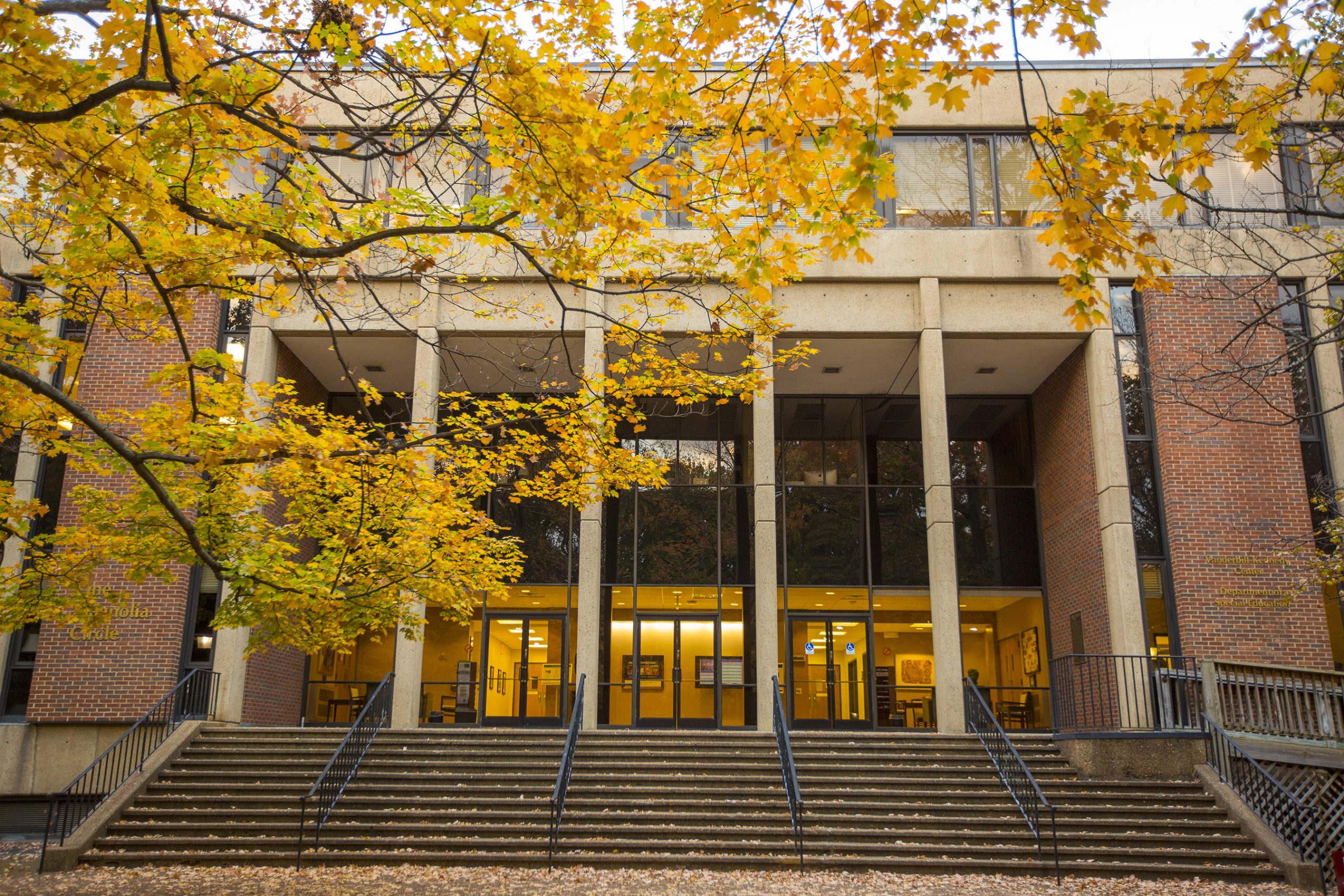
Quick links
- Admissions Checklist
- Request More Information
- Request Information
Program Overview
Acquire fundamental research methodology skills requisite for advanced positions in special education and engage in research on topics of particular interest and importance. Prepare and submit grant proposals-many of our students have received grants from the U.S. Department of Education. Have opportunities to publish throughout your program and present your work widely at state, regional, and national conferences. Develop a strong professional portfolio that leads to a faculty or research position in leading programs across the country.
Program Facts
Director of Graduate Studies: Robert Hodapp Admissions Coordinator: Kelly Limina Admission Term: Fall Application Deadline: December 1
Specializations
Early childhood program.
The Early Childhood Program is designed to serve infants, toddlers, young children, and their families who deal with a wide range of developmental delays including cognitive, communication, social, adaptive behavior, or motor skills.
High Incidence Program
The High Incidence Program is designed to serve children and young adults with learning disabilities, behavior disorders, and mild-to-moderate intellectual disability.
Low Incidence Program
The Low Incidence Program is designed to serve children, youth, and adults who have intellectual disability, autism, multiple disabilities, and other students with extensive support needs or visual disabilities.
Tuition and Financial Aid
All admitted Ph.D. students receive funding for at least four years of study, which includes full tuition, a monthly stipend competitive with any college of education in the nation, and health insurance. Based on presented qualifications, Peabody will nominate select students for additional honor scholarships and fellowships that supplement the baseline college award. SPED receives leadership training grants from the Office of Special Education Programs in the U.S. Department of Education that provide doctoral students with tuition, monthly stipends, health insurance, and professional travel. To be eligible for these grants, students must be U.S. citizens or permanent residents. Other funding streams are available for those who do not meet these requirements.
- Application Process
Online Special Education Doctorate Degree

Online Special Education Doctorate Degree: An Overview
How long does it take to earn a doctorate in special education online, how much does a doctorate in special education cost, online doctorate in special education admissions requirements, choosing an accredited online special education doctorate degree program, online coursework, dissertation or research project, professional associations in special education.
- National Association of Special Education Teachers : NASET is home to the Special Educator E-Journal, and the association’s website features links to additional publications and reading materials. Members may be eligible to earn board certification in special education at a reduced rate, and they also gain access to members-only professional development courses.
- ASCD : An organization dedicated to the supervision of curriculum development, ASCD represents more than 115,000 members worldwide, as well as 51 affiliate organizations. The association offers an extensive online learning center that includes member-only webinars and interactive courses, and also publishes Educational Leadership, a quarterly journal.
- Council for Exceptional Children : Founded with 12 members in 1922, CEC represents more than 27,000 members. The CEC website features a recorded webinar archive with dozens of entries, and the council also offers professional development activities and programs that satisfy continuing education requirements for teachers. Student members receive a 20 percent discount on their annual dues.
Example courses
- Special education law and policy
- Current issues and trends in special education
- Advanced study of best practices in special education
- Analysis/interpretation of research
- Preparing teachers of students with exceptionalities
Job Outlook and Salaries for Graduates
What can you do with a doctorate in special education.
- Instructional coordinator : Many instructional coordinators provide administrative support for academic and training programs at schools and universities, while some perform the same function in human resources departments for different organizations. They design and implement different types of educational curricula and also coordinate schedules for classrooms and facilities used for educational programs.
- Special education director : These employees oversee the special education departments at schools and support teachers and staff through counseling, training and continuing education. They may be employed at the district level or dedicate their work to specific educational facilities.
- Special education teacher, secondary school : Special education teachers at the secondary level work primarily with students with mild or moderate disabilities, emphasizing basic skills each learner will need in the real world. They often collaborate with other professionals to ensure individual student progress, including therapists, social workers and other teaching staff.
Licensure and certification
How much are salaries for doctorate in special education graduates.

Ph.D. in Special Education
What you can earn, credits earned, time commitment, upcoming deadline, our graduates are leaders and change agents.
The Special Education Doctoral Program is more than a traditional Ph.D. It's a transformative journey designed to create special education leaders who bring systemic change to educational and community settings. With a strong focus on inclusive education, we will prepare you with the skills, knowledge and relationships needed to drive structural and systemic change.
You'll craft a tailored program of study, blending advanced coursework in special education with diverse perspectives from outside disciplines. Our apprenticeship-style model combines face-to-face learning with real-world experiences, ensuring you're ready for impactful roles in research, teaching and service.
- We are a community that values the range of strengths, interests, and career goals that lead one to pursue a Ph.D. in special education
- We approach our work with a spirit of inquiry and collaboration, leading to differentiated experiences with each student
- We view doctoral graduates as leaders and change agents, equipped with the skills, knowledge, and relationships for advancing structural change
Our faculty specialize in the following areas:
- Research methodologies in special education (qualitative, quantitative, mixed methods, single case design)
- Teacher education and ongoing professional learning of special educators
- Intersectional issues of and approaches to addressing educational (in)justice
- Early intervention and early childhood
- Critical and disability studies perspectives on inclusive education
- Applied Behavior Analysis
- Literacy and reading instruction for individuals with disabilities
- Mathematics learning disabilities (dyscalculia)
- Positive behavior interventions and supports, social emotional learning, and multi-tiered systems of support
- Supporting learners with disabilities in inclusive settings

What you'll learn
In our program, you'll delve deep into specialized topics within special education and master research traditions, explore the historical and theoretical underpinnings of the field and construct meaningful research designs. You'll gain expertise in addressing the critical issues that affect children/youth (birth-21) and their families: access, inclusion and equity
After graduation
Upon graduation, our Ph.D. alumni go on to shape the future of special education. Whether as faculty members, researchers or leaders in educational institutions, they drive innovation and advocate for equitable access. Our graduates impact communities locally, nationally and even internationally.
Let's connect
We're excited that you're interested in our program! By joining our mailing list, you can receive updates on info sessions, deadlines, financial aid and more!
Connect with us
For additional information or questions regarding the doctoral degree, please email [email protected] or Maggie Beneke, Program Director .
Our program is designed to be both flexible and comprehensive. While most students complete their Ph.D. in 4-5 years, we understand that each academic journey is unique. You'll work closely with advisors to tailor your program, focusing on areas of research specialization that align with your goals and interests.
Within the first year of study, each student enrolls in the Educational Inquiry series with other first-year doctoral students across the College of Education. This helps you learn more about research traditions in educational research.
Special education doctoral students also enroll in a seminar which supports your:
- Understanding of the historical and theoretical background of special education
- Writing of a literature review related to a topic of interest
- Constructing of a research design
Admission requirements and process
As one of the top-rated doctoral programs in the U.S., we have more applicants than we can admit. Please pay close attention to all admission requirements. We also strongly encourage you to contact individual faculty members whose work aligns with your interests. Finding a fit with an advisor is critical to the admissions process.
To meet the individualized needs of students and advisors, our acceptance rate may vary. We generally accept annual cohorts of roughly 5-8 students.
Application deadlines are usually in January of each year for incoming fall cohorts.
- A bachelor's degree is required for the Master of Education (M.Ed.) program and the doctoral program
- Your degree can be in-process at the time of your application but must be completed before the program starts.
- Include one from each institution from which you've earned a degree and one from every institution you have attended in the previous 5 years.
- Your transcripts must include your name, coursework and degree (if completed)
- If you are offered admission, the UW Graduate School will request an official transcript from your most recent degree earned
The UW Graduate School requires a cumulative GPA of 3.0, or 3.0 for your most recent 90 graded quarter credits (60 semester credits). However, we review your application holistically. If your GPA is below 3.0, contact us at [email protected] for advice on how to strengthen your overall application by connecting with a Graduate Admissions Advisor.
During the online application process, you will be given instructions for adding your recommenders and getting their letters submitted electronically.
A current academic and professional resume or vita is required. In addition to educational degrees and professional experience, you should include a listing of all relevant awards, publications, presentations or other achievements that will help us evaluate your application.
- 1-2 pages for M.Ed.
- 3-5 pages for Ph.D.
Admissions committees use your statement of purpose, along with other evidence, to determine whether your goals are well-matched with our programs. Your statement should address goals, relevant experience, future plans and how the desired specific program meets your needs. Be sure to include personal experiences that have prepared you for the challenge of graduate school, topics like:
- Scholarly interests
- Career goals
- Your match for the program
- Faculty interests
While optional, you can add to your application by submitting a personal history statement with each application. This statement should address your intellectual growth and development, inclusive of and beyond your academic goals. Speak to topics like:
- Educational, cultural and economic opportunities and disadvantages you've experienced
- Ways these experiences affected the development of your special interests, career plans and future goals.
Statements should be no longer than two pages long. And while there are no standard formatting requirements, we encourage double-spaced text with a legible font.
Doctoral candidates must submit one sample of scholarly writing (e.g., course papers, articles, essays). The sample should demonstrate how well you can analyze or synthesize and critically reflect on information. The writing sample must have been written by you alone.
If you have no appropriate examples of scholarly writing, we urge you to consider preparing a medium-length (10-12 page) critical essay review of a book that you feel is central to your interests in education. The writing sample will be uploaded in your online application. Faculty will only review one writing sample.
- Gather all required documents
- Visit the Graduate School website
- Log into your account or create a new profile if you are a first-time applicant
- Complete all steps in application process and upload your documents
- You may request a fee waiver during the application process
- Submit your application
Here is our general timeline for decisions. Have questions about the process? Visit our graduate admissions page .
Step 1: Application processing
- Within 7 business days after the deadline, we will check if your application if fully complete
- We will email you whether your application is complete or incomplete
- If your application is missing anything, you will have a short amount of time submit these items
- You can also log into the online application and check your status and see any missing items
Step 2: Application review
- Committees begin reviewing applications about three weeks after the deadline
- You will receiving an email when your application has entered the review phase
Step 3: Decision notification
- The final decision will be emailed to you
- Your status will also be updated in the online application
We value and welcoming applications from international students! If you are applying from outside the United States, there are additional requirements and application materials.
- At minimum, you must have the equivalent of a U.S. bachelor's degree (a four-year degree from an institution of recognized standing)
- The national system of education in the foreign country
- The type of institution
- The field of study and level of studies completed
- International transcripts must be submitted in the original language.
- Your transcript should include date of graduation and title of the awarded academic degree
- If your transcript is not in English, you must also provide a certified English translation
- You do not need to have your transcript evaluated for the degree by an agency
Per UW Graduate School policy , you must submit a demonstration of English language proficiency if your native language is not English and you did not earn a degree in one of the following countries:
- United States
- United Kingdom
- New Zealand
- South Africa
- Trinidad and Tobago
The following tests are accepted if the test was taken fewer than two years ago:
- Minimum score: 80
- Recommended score: 92+
- The UW's 4-digit code is 4854
- University of Washington All Campuses, Organisation ID 365, Undergrad & Graduate Admis, Box 355850, Seattle, WA, 98105, United States of America
- Minimum score: 6.5
- Recommended score: 7.0+
- School information for submission: University of Washington, All Campuses Undergraduate & Graduate Admission Box 355850 Seattle, WA 98195
- Minimum score: 105
- Recommended score: 120+
- Follow the instructions on the Duolingo website to submit your scores
If apply and are offered admission to UW, you will need to submit a statement of financial ability.
Costs and funding
We are a tuition-based program. Estimated tuition rates are based on your residency:
- Washington state residents: $19,584 per year
- Out-of-state students: $35,352 per year
Estimates are subject to change and may differ due to course load and summer quarter enrollment. Estimates include building fees, technology fees, U-Pass, etc. Additional program-specific fees are not included in this estimate.
View the UW tuition dashboard → Visit the Office of Planning & Budgeting →
Currently, nearly all students seeking funding are supported throughout their program. Our special education program and associated research centers strive to fund each student throughout their program. Funding is contingent upon various factors including levels of funding, student prior experience (e.g., practical experience as a former teacher or therapist), enrollment status as a full-time student, and student performance.
Graduate Student General Scholarships
Frequently asked questions.
Your primary consideration should be specialization and fit with a potential advisor based on your research interests and career goals. We strongly encourage you to review the faculties’ areas of specialization, read faculty bios, and contact individual faculty about your interests in pursuing a special education doctoral degree at UW.
There are a number of supports and affinity spaces for graduate students within and beyond the College of Education. These include (among others):
- Associated Students of the College of Education
- Center for Communication, Difference, and Equity
- Disability Resources for Students
- The D Center
- Indigenous Wellness Research Institute
- Intellectual House
- Latino Center for Health
- Native Organization of Indigenous Scholars
- Office of Student Diversity and Inclusion
- Samuel E. Kelly Ethnic Cultural Center
- Washington Institute for the Study of Inequality and Race
- Women of Color Collective
- Women’s Center
- Writing Center
Seattle is a city of self-starters who believe that anything is possible when we work together. We’re adventurous and entrepreneurial, caffeinated and connected. This global hub for innovation is an international epicenter for turning ideas into actions, and the UW is at the heart of it. Whether you’re into art or food, history or tech, city living or the outdoors, there’s a community for you here.
We hold a virtual interview process for applicants with competitive applications. You are welcome to schedule a visit on your own - please let us know if you are planning to come! The College of Education also holds annual Admitted Student Day in the spring. Once applicants are admitted, advisors may apply for funds to support student visits. If you have been admitted and are interested in visiting, we encourage you to speak with your advisor about applying for student visit funds.
As one of the top-rated doctoral programs in the U.S., we have more applicants than we can admit. Please review admission requirements. Beyond the application requirements, finding a fit with an advisor or advisor(s) is critical to the admissions process. Again, we strongly encourage you to contact individual faculty members whose work aligns with your interests.
To meet the individualized needs of students and advisors, our acceptance rates vary. We generally accept annual cohorts of roughly 5-8 students.
Our application deadline is usually in January of each year for incoming autumn quarter cohort.
No. The doctoral program is designed for face-to-face coursework and experiences. Such an apprenticeship model is critical for doctoral preparation in the areas of research, teaching, and service.
Graduates of the Ph.D. program in Special Education go on to a range of careers locally, nationally, and internationally. Graduates go on to careers as faculty members, researchers, or leaders in school districts, state agencies, or educational businesses.
Program Faculty

Maggie Beneke

Carol Davis

Alice Bravo

Angel Fettig

Roxanne Hudson

Katherine Lewis

Kathleen Artman Meeker

Charles Peck

Selma Powell

Carly Roberts

Nancy Rosenberg

Ilene Schwartz

Scott Spaulding
Doctor of Education (EdD) in Special Education Prepare for Your Next Step

Credit Hours
View Courses
100% online,* 8-week courses
Transfer in up to 50% of the degree total
Prepare to Shape the Future of Special Education with a Doctor of Education in Special Education Degree
Are you interested in furthering your career in education? Do you have experience in or are looking to branch out into special education? Do you want to develop a deep understanding of the inner workings of a successful special education program?
It takes dedicated and equipped individuals to make a positive impact in the field of education – even more so in special education. Our Doctor of Education (EdD) in Special Education is designed to help you become well-equipped to communicate through various mediums, critically problem-solve, and increase information literacy through examining current literature and research. These skills are essential to effectively lead in special education.
This program can help enthusiastic educators like you develop the knowledge and skills needed to make a profound impact in the field of special education. If you have a passion for molding the minds of others and desire specific training in the area of special education, Liberty University’s 100% online EdD in Special Education may be the right fit for you.
Partner with us and further your education so you can invest in others and create change for the good. Embark on this transformative educational experience and discover how our program can empower you to become a leader, advocate, and catalyst for change in the lives of individuals with special needs.
*Some exclusions apply. Please refer to our exclusions page for more information.

Ranked in the Top 10% of Niche.com’s Best Online Schools in America
- What Sets Us Apart?
- Private Nonprofit University
- 600+ Online Degrees
- No Standardized Testing for Admission
- Transfer in up to 75% of an Undergrad Degree
- Transfer in up to 50% of a Grad/Doctoral Degree
Why Choose Liberty’s Special Education EdD Degree?
Liberty University is committed to preparing future educators and leaders who can impact the broader field of education for Christ. Our EdD in Special Education is a 100% online program that provides advanced training for educators across various fields. Whether your goal is to work directly with those who have special education needs, design curricula, serve in the administration, or lead an organization, this program can provide you with a well-rounded understanding of learning theory and help you apply it to your professional endeavors.
At Liberty University, we believe in the integration of faith and learning. Our program is founded on a strong Christian worldview, providing a distinct perspective that permeates every course we offer. You can have the opportunity to explore the intersection of biblical truth and the principles of special education, allowing you to develop a deeper understanding of the ethical and moral dimensions of this field.
Additionally, our dedicated faculty members are accomplished professionals in the field of special education. They bring a wealth of experience and expertise to the virtual classroom, ensuring that you receive the highest quality education. You can learn from professors who are committed to mentoring and guiding you throughout your doctoral journey, providing valuable insights and personalized support.
The 100% online format of our EdD in Special Education degree program allows you to further your education and career while maintaining your personal life. When you partner with Liberty University, you can be confident that you are entering an environment designed with your success in mind.
What Will You Study with Our EdD in Special Education Degree?
The EdD in Special Education program is structured to help you expand your knowledge in the realm of serving students with special needs. Through this program, you can:
- Analyze pedagogical concepts and approaches based upon research and knowledge of the discipline for high-impact practices.
- Assess educational theories within the field for professional and academic practice.
- Design and conduct original research that adds to the knowledge base of the discipline.
- Evaluate the process of designing a curriculum and implementing instructional practices.
- Integrate a biblical worldview when defending ethical and moral decision-making within the field of education.
The courses in the EdD in Special Education online program are broken down into 4 groups: education courses, special education core courses, research courses, and capstone project courses. You can have the unique opportunity to deepen your understanding of the broader education field while further focusing on special education. The education courses cover advanced learning theory and research, theories of historical and philosophical foundations, and your choice of either issues and trends in learning technologies or organizational analysis and problem-solving.
The courses specific to special education incorporate the history and future of the field, administration and supervision, collaboration and communication, assessment and evaluation, disability and learning, and critical review of special education literature. You’ll explore principles of special education and disability advocacy from a Christian perspective as well as trace current and historical trends and issues in the treatment of people with disabilities. You can develop the necessary skills for effective leadership, management, and supervision in special education and disability services.
The EdD in Special Education is specifically designed to emphasize the analysis of applied research and the practical application of that research through the creation and presentation of a capstone project. Toward the end of the program, before developing your capstone, you will take research courses that include a survey of educational research, applied research methods, literature review for applied research, and applied research concepts and methodology. To culminate the program, you will conduct original research in the field of special education to be developed into a final capstone project.
Potential Career Opportunities
- Education instructor
- Educational consultant
- K-12 educational technology director
- University administrator
- University professor
Featured Courses
- EDSP 722 – History and Future of Special Education
- EDSP 724 – Collaboration and Communication in Special Education
- EDSP 725 – Assessment and Evaluation in Special Education
- EDSP 726 – Disability and Learning
Degree Information
- This online EdD degree falls under the School of Education .
- View the Graduate Education Course Guides ( login required ).
- This is a non-licensure program.
Degree Completion Plan (PDF)

Not sure what to choose?
Speak to one of our admissions specialists to help you choose the program that best fits your needs.
- Tuition & Aid
Your success is our success, which is why we are committed to providing quality academics at an affordable tuition rate. While other colleges are increasing their tuition, we have frozen tuition rates for the majority of our undergraduate, graduate, and doctoral programs for the past 9 years – and counting.
All Tuition & Fees
Financial Aid & Scholarships
Financial Aid Forms & Eligibility
Scholarship Opportunities
- Admission Information
Admission Requirements
- A non-refundable, non-transferable $50 application fee will be posted on the current application upon enrollment (waived for qualifying service members, veterans, and military spouses – documentation verifying military status is required) .
- Send official college transcripts (mailed as sealed, unopened copies or sent via a direct electronic transcript system). A regionally or nationally accredited master’s degree with at least a 3.0 GPA is required for admission in good standing.
- Applicants whose native language is other than English must submit official scores for the Test of English as a Foreign Language (TOEFL) or an approved alternative assessment. For information on alternative assessments or TOEFL waivers, please call Admissions or view the official International Admissions policy .
The Office of Graduate Admissions may request additional documentation when conducting admission reviews to evaluate a candidate’s record before a final admission decision can be made.
Please note: Guidelines are subject to change in federal or state regulations for the licensure of school personnel.
Preliminary Acceptance
If you are sending in a preliminary transcript for acceptance, you must:
- Be in your final term and planning to start your doctoral degree after the last day of class for your master’s degree.
- Complete a Master’s Self-Certification Form confirming your completion date. You may download the form from the Forms and Downloads page or contact an admissions counselor to submit the form on your behalf.
- Submit an official transcript to confirm that you are in your final term. The preliminary transcript must show that you are within 6 credit hours of completion for a 30-48 credit hour master’s degree or within 9 credit hours of completion for a 49+ credit hour master’s degree.
- Send in an additional, final official transcript with a conferral date on it by the end of your first semester of enrollment in the new doctoral degree.
Transcript Policies
Official college transcript policy.
An acceptable official college transcript is one that has been issued directly from the institution and is in a sealed envelope. If you have one in your possession, it must meet the same requirements. If your previous institution offers electronic official transcript processing, they can send the document directly to [email protected] .
Admissions Office Contact Information
(800) 424-9596
(888) 301-3577
Email for Questions
Email for Documents
Liberty University Online Admissions Verification
1971 University Blvd.
Lynchburg, VA 24515

Ready to Apply?
Submit your application online or over the phone.
Apply by phone: (800) 424-9595
Liberty University is dedicated to providing world-class educational experiences to military students across the globe.
Who May Qualify?
- Active Duty
- Reserve/National Guard
- Veterans/Retirees
- Spouses of Service Members and Veterans/Retirees
- Current Department of Defense Employees
Available Benefits:
- Tuition discounts – $275 per credit hour for EdS and EdD courses
- Additional discount for veterans who service in a civilian capacity as a First Responder (less than $625 per course)
- 8-week courses, 8 different start dates each year, and no set login times (may exclude certain courses such as practicums, internships, or field experiences)
Frequently Asked Questions
What is the online doctor of education (ed.d.) program.
Do you want to reach the pinnacle of achievement for advanced education studies? Liberty University’s online Doctor of Education (Ed.D.) program provides all of the advanced education administration, research, curriculum development, and learning theory skills and knowledge needed to help you make a positive impact on the world of education. Through Liberty University’s doctorate in education online program, you will engage with knowledgeable professionals in the field of education who will mentor you in your development as an educator, administrator, and researcher.
Our Ed.D. degree offers a robust theoretical framework that extends your teaching methods and theories to a higher order of application, allowing you to evaluate and address teaching challenges in K-12 institutions and at the university level. Liberty’s online Ed.D. degree allows you to focus on your coursework at home and complete essential hands-on training with flexible scheduling that will meet your needs. To add to this flexibility, our online Ed.D. degree integrates the doctoral capstone project research into your course material so that you can complete this comprehensive demonstration of your education expertise more quickly.
Inner Navigation
- Why Choose Liberty?
- What Will You Study?
Have questions?

Are you ready to change your future?
Apply FREE This Week*
Request Information
*Some restrictions may occur for this promotion to apply. This promotion also excludes active faculty and staff, military, non-degree-seeking, DGIA, Continuing Education, WSB, and certificate students.
Request Information About a Program
Request info about liberty university online, what program are you interested in, choose a program level.
Choose a program level
Bachelor’s
Master’s
Certificate
Select a Field of Study
Select a field of study
Select a Program
Select a program
Next: Contact Info
Legal first name.
Enter legal first name
Legal Last Name
Enter legal last name
Enter an email address
Enter a phone number
Full Address
Enter an address
Apt., P.O. Box, or can’t find your address? Enter it manually instead .
Select a Country
Street Address
Enter Street Address
Enter State
ZIP/Postal Code
Enter Zip Code
Back to automated address search
Start my application now for FREE
Ph.D. in Education: Special Education and Disability Studies
Study in this area of emphasis on issues of disability as they apply to education and human service agencies. Students may focus broadly across disability areas and age ranges, or they may focus more narrowly. Courses are available in the categorical areas of learning disabilities, emotional/behavioral disorders, autism, intellectual disabilities and severe multiple disabilities, and early childhood special education. Cross-categorical courses are also offered, as well as special topics courses related to key contemporary issues in special education.
World-Improving Research and Creativity
The doctorate in Special Education and Disability Studies focuses on issues of disability as they apply to schools (with a focus on teacher preparation) and to human service agencies.
Admission Deadlines
Applications and all associated documents must be received by the following dates to be considered. Fall Semester: July 1 | Spring Semester: Oct. 1.
About Our Program
Students may focus broadly across disability areas and age ranges, or they may focus more narrowly. Areas of study are available in the categorical areas of learning disabilities, emotional/behavioral disorders, intellectual disabilities and severe multiple disabilities, and early childhood/special education/early intervention. Cross-categorical courses are also offered, as well as special topics courses related to key contemporary issues in special education. The program has an emphasis area that the Association for Behavior Analysis International has verified toward the coursework requirements for eligibility to take the Board Certified Behavior Analyst® (Option 1) examination. Applicants will need to meet additional requirements before they can be deemed eligible to take the examination. Applicants interested in the BCBA should contact MaryAnn Demchak for more information at [email protected] .
A key focus of the program is on preparing individuals for jobs in the special education professoriate; however, the doctorate may be tailored for individuals wishing to become special education leaders at the district or state level or work with individuals with disabilities in other agencies, such as college disability support services or non-profit support services.
The Special Education and Disability Studies area of emphasis is guided by the general framework found in the Doctoral Program in Education Application Handbook . The manual provides general information about doctoral concentrations offered in the College of Education. This page will provide you with specific information that is unique to the Special Education and Disability Studies strand.
Request More Information
Program information.
If you miss the Graduate School deadline, you may still apply to be a Graduate Special to begin taking coursework for your intended first semester. Materials and criteria for the Special Education and Disability Studies area of emphasis are as follows:
- International Studies: TOEFL score of 550 (unless you have a college degree from a U.S. institution)
- Undergraduate and Graduate GPA 3.00 (university requirements)
- Preference for applicants who hold a master's degree from a regionally accredited institution in an area appropriately related to special education. High achieving applicants who possess only a Bachelor's degree from a regionally accredited institution will be considered. Emphasis of prior degree area(s) should be appropriately related to special education.
- Program application form (included in COEHD doctoral application manual)
- Complete vita/resume
- Sample of scholarly writing
- Essay of intent - should include qualifications for completing a doctoral degree and reasons for pursuing the degree
- Three letters of recommendation from professionals qualified to judge potential for success in doctoral work
- Preferred: at least three years teaching special education in a U.S. public school or commensurate experience
All questions regarding application and admission may be directed to Dr. Shanon Taylor, program coordinator and graduate director for special education, at [email protected] .
All materials are submitted through the University's application portal . Once you create your account, go back to MyNevada to log in and start your application. Please reach out to Dr. Taylor if you have any questions.
Program Structure
The Doctor of Philosophy (Ph.D.) program requires a minimum of 72 credits beyond the baccalaureate degree, which includes a minimum of 12 credits of dissertation. Of the remaining 72 credits, a maximum of 24 credits (with grades of B or better) may be applied from a master's degree program or previous post-baccalaureate graduate studies program toward the doctoral degree. These credits must be approved by your chair, the College of Education Doctoral Director of Graduate Study, and the Dean of the Graduate School. Credit for completion of a thesis or special project may not be included. There is no limit on the number of units transferred when student earns master’s en route to Ph.D.
At least 30 credits of 700-level courses beyond the bachelor's degree, exclusive of dissertation credits, are required for the Ph.D. degree. Degree requirements must be completed within 8 years of admission to the program.
24 credits: Research and required core
- Doctoral Seminar in Education
Required Research Courses:
- One Quantitative research course
- One Qualitative research course
- Program Development and Evaluation
- Survey Research in Education
- Research Applications in Education
- Mixed Methods Research in Education
- Special topics research course such as Single Subject Design
- Others from outside COE (with approval)
- Lower level courses such as EDRS 640 and EDRS 700 or equivalents are prerequisites
- Course names and requirements are subject to change. Please visit the course catalog for the most current information.
36 credits(dependent upon number of dissertation credits carried): Area of emphasis
Coursework is determined by the Advisory/Examining Committee in close consultation with the student. Credits brought in from Master’s degree may apply to area of emphasis.
Minimum of 12 credits: Dissertation
The dissertation is the culminating experience for the doctoral degree. It represents an independent research project that makes a contribution to the field of study.
Coursework earned as part of a master’s degree can count toward the area of emphasis, as well as toward the research or cognate areas, depending on relevance. Decisions about prior coursework are approved by your chair and your Advisory/Examining Committee.
Our program goal is for all students to complete the doctoral degree within 5-6 years. Research has shown that students who work on this trajectory have the highest chance of ultimately completing their doctoral studies. The best way to meet this objective is full-time studies; however, we have students in our program who are part-time students. You will be advised to work closely with your initial advisor and ultimately your chair to develop a timeline and program of study that meets your career goal and is most likely to result in completion.
Research Completed by Doctoral Students
Below are articles, posters, presentations, and more completed by our current doctoral students.
- Parents of Children with Significant Disabilities Describe Their Children’s Eating Habits: A Phenomenological Study Brianna Grumstrup & MaryAnn Demchak This qualitative phenomenological study, through interviews, aimed to understand the experiences of parents of children with significant multiple disabilities about their children's eating habits. (Note: This website link may leverage 3rd party web/multimedia content, if you experience any issues accessing this content, please notify [email protected] .)
- Sexual Health Education for Individuals with Disabilities: A Call to Action Anna Treacy, Shanon S. Taylor , & Tammy V. Abernathy Expressing sexuality is part of the human experience, yet sexual health is often ignored in regard to persons with disabilities. Individuals with disabilities are at risk of sexual abuse and exploitation, unwanted pregnancies, and sexually transmitted diseases. (Note: This website link may leverage 3rd party web/multimedia content, if you experience any issues accessing this content, please notify [email protected] .)
- Transitioning Adolescents with Emotional and Behavioral Disorders from Most-to-Least Possible Restrictive Environments: Views of Transition Service Providers Natasha Maximoff, Shanon S. Taylor , & Tammy V. Abernathy This study examined the transition from most-to-least possible restrictive environments for youth with emotional and behavioral disorders. Components of positive transition experiences were identified from the literature as planning for transition at intake in such a way as to promote continuity of care, family involvement, academic and employment success, and assistance in navigating the adult mental health system and services. (Note: This website link may leverage 3rd party web/multimedia content, if you experience any issues accessing this content, please notify [email protected] .)
- Exploring the Importance of an Introductory Doctoral Course Anna Treacy, Nicole Casillas, and Lynda Wiest This article presents a case study conducted by two course participants and a course instructor who jointly explored their experiences in an introductory doctoral course they had recently completed.
Current students: you can submit your research projects here .
Looking for a Graduate Assistantship?
The College of Education & Human Development has a limited number of Graduate Assistantships for full-time students admitted to masters or doctoral programs.
Program Faculty

Joint Doctoral Program in Special Education
The JOINT Doctoral Program in Special Education prepares leaders in research, teaching, administration, and supervision for the variety of professional needs facing children, youth, and adults with disabilities. It integrates the resources of UC Berkeley and San Francisco State University ( SFSU ) and provides an opportunity for students to combine theoretical interests with applied practices in a broad spectrum of specializations within Special Education.
Focus of Study
Students select an area of academic specialization in both special and general education. Faculty and program resources at both Berkeley and SFSU are used to develop advanced knowledge of theory and research in an area of exceptionality.
Specializations include human development; early childhood, language and literacy; mathematics, science, and technology; educational policy and administration; and other areas selected by students in consultation with faculty advisers. In the program students develop three areas of emphasis or specialization.
Program Structure
Students in the Joint Doctoral Program in Special Education fulfill the same requirements as all doctoral students at Berkeley’s School of Education. They complete a body of coursework, that includes three areas of specialization, three position papers that include one empirical study, oral examination on the areas of specialization, dissertation proposal and defense without a final dissertation defense.
Courses are taken at both Berkeley and SFSU .
Entrance Requirements
Individuals from related disciplines in the social, behavioral, and health sciences who seek leadership and research training in Special Education and Human Development are encouraged to apply.
Consideration is given to successful experience in working with individuals with disabilities, or in programs serving these populations, but not required
For more information, please read the Joint Doctoral Program in Special Education Handbook .
Type of Program (PhD)
This program offers a PhD in Special Education.
Graduates have pursued professional positions at major universities nationally and internationally. Our graduates hold faculty positions at: CUNY, Vanderbilt, Florida State University, Gallaudet University, Hebrew University, Tennessee State University, University of California, Santa Barbara, University of California, Irvine and University of Hawaii, among others. Many graduates have also become faculty members and administrators at the various CSU campuses, including East Bay, Northridge, San Francisco State, and San Jose. Other local institutions include the University of San Francisco and College of Alameda.
Graduates have also gone on to serve as directors of special education, administrators, and clinically based programs in public or private facilities. Examples of these position include: Director, King County Vocational Special Education, Seattle, Wash.; Special Education Consultant, California Dept. of Education; Senior Program & Policy Associate, U.S. Department of Education, Washington, D.C.
Extracurricular
Doctoral students from all UC campuses are encouraged to participate with the UC SPEDDR Center for Research (Research in Special Education, Disabilities, and Developmental Risk). UC SPEDDR is a California-wide multi-UC campus research unit that aims to enhance the ability of the UC system to attract from a national pool of talented students, win large extramural grants, improve national visibility, and enhance the doctoral preparation of the next generation of research, teacher education, and other related public service doctorates.
How to Apply: Joint Doctoral in Special Education (PhD)
UC Berkeley School of Education [email protected] SF State University Department of Special Education & Communicative Disorders 156 Burk Hall (415) 338-1161 [email protected]
25 Best Online Doctorate in Special Education [2024 Guide]
Special education is a passion for many people, but if you want to distinguish yourself with the highest educational qualification of the field, then an online doctorate in special education may be the path for you.

Earning a doctoral degree is no easy feat, as it consists of several years of intensive coursework and either a dissertation or capstone project. While it does require great commitment and determination, many people find that the hard work is well worth it.
Editorial Listing ShortCode:
Let’s explore what it’s like to earn a doctoral degree online as well as how an EdD or PhD in Special Education can help you achieve your goals post-graduation.
Universities Offering Online Doctorate in Special Education Degree Programs
Methodology: The following school list is in alphabetical order. To be included, a college or university must be regionally accredited and offer degree programs online or in a hybrid format.
1. Ball State University
Ball State University offers a Doctorate in Education along with a Special Education concentration. There’s a general special education track as well as tracks in applied behavioral analysis and autism, high incidence and low incidence teaching and training, and emotional and behavioral disorders. The program is approximately 90% online.
Ball State is accredited by the Higher Learning Commission.
2. Capella University
The PhD in Education program at Capella University features a concentration in Special Education Leadership.
It includes 4 core courses and 10 specialization courses as well as a dissertation, 2 internships, and 3 residencies. Students learn about special education curriculum, instruction, community and family collaboration, financial resources, and laws and regulations.
Capella University is accredited by the Higher Learning Commission.
3. City University of Seattle
Students enrolled in City University of Seattle’s Doctor of Education in Leadership program can select concentrations from organizational leadership, higher education leadership, or specialized study.
The specialized study option opens many additional avenues of study tailored to fit students’ individual needs. The school also offers an endorsement in special education.
CityU is accredited by the Northwest Commission on Colleges and Universities.
4. Drexel University
Drexel University’s Doctor of Education in Educational Leadership and Management program features ten concentrations, including one in Special Education Leadership.
Its goal is to provide students with the skills, resources, and knowledge necessary to become special education program directors. Most students usually finish the program in 3 to 5 years.
Drexel University is accredited by the Middle States Commission on Higher Education.
5. Duquesne University
Students enrolled in Duquesne University’s PhD in Special Education program should learn a lot about social justice, early intervention, assessment, and curriculum design. It’s an 80 credit program that allows both full-time and part-time students to enroll. The program features further specializations in assessment and learning and autism and behavior.
Duquesne University is accredited by the Middle States Commission on Higher Education.
6. Grand Canyon University
Grand Canyon University’s Doctor of Education in Organizational Leadership program offers students a concentration in Special Education.
It’s a qualitative program that focuses primarily on research. The curriculum includes courses such as foundations of research design, qualitative data analysis, results and findings, designing a qualitative study, and special education law.
Grand Canyon University is accredited by the Higher Learning Commission.
7. Gwynedd Mercy University
Gwynedd Mercy University offers a quick and flexible way to earn a doctoral degree with its 54 credit, online, accelerated Executive Doctorate in Educational Leadership program.
Students can choose from four concentrations, including one in Leadership in Special Education. Focus is placed on educational research, teaching, curriculum development, and education policy.
Gwynedd Mercy University is accredited by the Middle States Commission on Higher Education.
8. Liberty University
Liberty University’s Doctor of Education in Curriculum and Instruction program includes a Special Education concentration for students hoping to become special education instructors or program directors, gifted student instructors, or school administrators.
The curriculum focuses on organization and design of gifted education programs, educational assessment, classroom management, and learning theory.
Liberty University is accredited by the Southern Association of Colleges and Schools Commission on Colleges.
9. National University
National University offers a PhD in Education with a Special Education specialization. The program is designed for special education professionals who work in a variety of settings and want to make significant scholarly contributions to the field.
The curriculum involves research and advanced study of topics such as educational equity, inclusion, educational leadership, and methods for monitoring student progress.
National University is accredited by the WASC Senior College and University Commission.
10. Nova Southeastern University
The Doctor of Education in Special Education program at Nova Southeastern University is specifically designed for current education professionals hoping to move into special education leadership positions.
The curriculum is diverse and comprehensive, and students can choose between giving traditional dissertations or completing strategic research projects to earn their degrees.
NSU is accredited by the Southern Association of Colleges and Schools Commission on Colleges.
11. Portland State University
Portland State University offers its educational leadership doctorate program 100% on-campus, 100% online, and in hybrid format. It features multiple specializations from which students can choose. One of these is the special education concentration. It’s main focus is on the leadership of agencies, schools, and communities serving people with disabilities.
Portland State University is accredited by the Northwest Commission on Colleges and Universities.
12. Regent University
Regent University’s Doctor of Education program is a Christian-oriented program designed to train 21st century leaders for every aspect of education.
There are numerous concentrations available, but students hoping to become special education leaders and directors can select the Special Education concentration to learn about special education policy, practice, and research.
Regent University is accredited by the Southern Association of Colleges and Schools Commission on Colleges.
13. Slippery Rock University
The Doctor in Special Education program at Slippery Rock University is for current educators and human service workers who want to transition into special education leadership positions. The degree requires 60 total credits for completion, but students can transfer up to 12 previously earned credits into the program.
Slippery Rock University is accredited by the Middle States Commission on Higher Education.
14. St John’s University
Although St. John’s University doesn’t offer a doctoral degree in special education, it does offer a PhD in Literacy with an optional TESOL and Bilingual Education concentration. This degree can lend itself nicely to careers in special education because of its foundations of literacy and special topics in literacy courses.
St. John’s University is accredited by the Middle States Commission on Higher Education.
15. Texas Tech University
Students in Texas Tech University’s PhD in Special Education program should be prepared for careers as consultants, specialists, teachers, and researchers. The curriculum adheres to the code of ethics put in place by the Council for Exceptional Children and requires 90 credits for completion. Currently, GRE scores are being waived.
Texas Tech University is accredited with the Southern Association of Colleges and Schools Commission on Colleges.
16. University of Alabama
The University of Alabama offers an online Doctor of Education in Special Education with specialized tracks in Leadership, Autism, Collaborative, and Gifted. New sessions begin every fall. The program requires 72 credits, including both coursework and a dissertation. Courses may be synchronous or asynchronous.
The University of Alabama is accredited by the Southern Association of Colleges and Schools Commission on Colleges.
17. University of Colorado – Denver
University of Colorado – Denver’s Doctor of Education in Leadership for Educational Equity program is a special education doctoral degree focused specifically on early childhood learners.
Graduates should understand the issues surrounding inclusive early childhood education, advocate for children with disabilities and diverse abilities, and become effective leaders in the field.
The University of Colorado – Denver is accredited by the Higher Learning Commission.
18. University of Florida
The Doctor of Education in Special Education program at the University of Florida seeks to educate participants in all matters of special education. Students learn to advocate for individuals with disabilities, serve as school leaders and service providers for these individuals, and communicate and work collaboratively with the individuals’ families.
The University of Florida is accredited by the Southern Association of Colleges and Schools Commission on Colleges.
19. University of North Dakota
University of North Dakota’s Doctorate in Education in Educational Practice and Leadership is a 100% online program designed for working educational professionals. The degree takes about 3 years to complete, and there’s a Special Education concentration. Most of the courses in this concentration focus on the field of educational diagnostics.
The University of North Dakota is accredited by the Higher Learning Commission of the North Central Association of Colleges and Schools.
20. University of Northern Colorado
The University of Northern Colorado offers a PhD in Special Education that’s flexible and allows students to customize their courses based on their interests and skills.
The program puts a strong focus on evidence-based practice, research methodology, pedagogy, public policy, collaboration, and educational theory. The school doesn’t charge out-of-state tuition.
The University of Northern Colorado is accredited by the Higher Learning Commission.
21. University of Pittsburgh
University of Pittsburgh offers both a Doctor of Education in Special Education and a PhD in Special Education. The PhD program focuses more on the actual education of students and covers topics like early intervention and education of students with mental and physical disabilities. The EdD in Special Education program is more research-based.
The University of Pittsburgh is accredited by the Middle States Commission on Higher Education.
22. University of Southern Mississippi
The PhD in Education with a concentration in Special Education program at the University of Southern Mississippi requires 66 credits for completion and meets Mississippi state standards for advanced licensure. There are several qualitative research and quantitative analysis courses in the curriculum as well as courses specific to special education.
The University of Southern Mississippi is accredited by the Southern Association of Colleges and Schools Commission on Colleges.
23. University of Toledo
University of Toledo’s Doctorate in Curriculum and Instruction program features a Special Education concentration that focuses on turning educators into special education leaders and directors. It’s a rigorous, 60 credit program that usually takes between 4 and 5 years to finish. Students will participate in several virtual internships as well.
The University of Toledo is accredited by the Higher Learning Commission.
24. University of West Georgia
University of West Georgia’s Doctor of Education in School Improvement program features nine different concentrations as part of its program.
Students who choose the Special Education concentration will take courses in autism instruction and collaboration, autism characteristics and theory, administrating special education programs, special education law, and program planning and evaluation.
UWG is accredited by the Southern Association of Colleges and Schools Commission on Colleges.
25. Walden University
Walden University’s Doctor of Education in Special Education program requires 79 quarter credits, one face-to-face residency, and a doctoral writing assessment to complete.
Graduates are expected to be able to evaluate the ethical and legal merits of policies surrounding special education, implement assessments and interventions, and evaluate special education programs.
Walden is accredited by The Higher Learning Commission.
Special Education Online Doctoral Programs

Achieving a doctoral degree should make you an expert in the field of special education. This could lead to a variety of career paths, including administrative roles in school systems or higher education, research roles for private organizations, and leadership roles for human services agencies.
In a special education doctoral degree program, you will take advanced courses on disabilities and how they affect a student’s education as well as courses on educating gifted students.
Research is also a major focus for a doctoral program. You will likely take statistics and qualitative research courses, which will help prepare you for your dissertation or capstone project of your program.
Research courses will also give you the tools you’ll need to contribute new ideas and information to the body of special education research. These tools will also assist you in staying current in the field throughout your career.
Because there are many laws that impact education, you can also expect to take courses on educational law. This will help you be well-versed on the various methods that comply with the laws of today and of the future.
Special Education Careers & Salaries
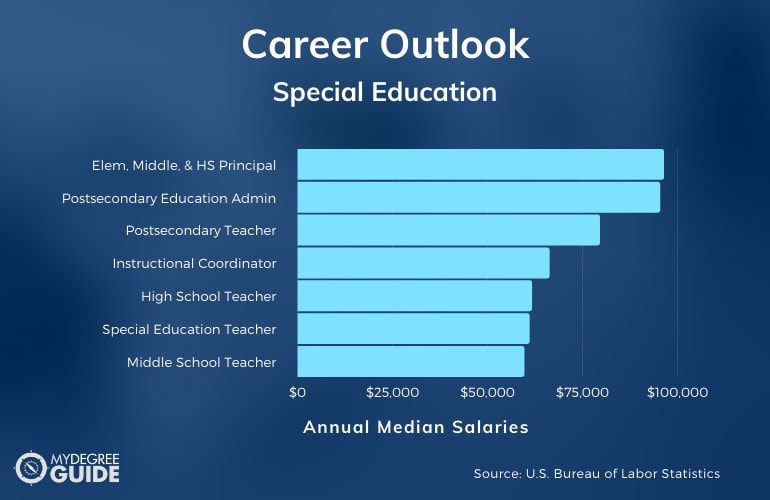
A doctoral degree in special education online can lead to many worthwhile careers, including leadership, teaching, or research roles in school systems, higher education, or other organizations.
With this online education degree you could train the next generation of teachers in an education program at a college or university. You could also become an administrator in higher education, potentially leading and directing student success and accessibility departments.
If working in K-12 schools is your goal, then a doctoral degree along with teaching experience would leave you qualified to be a school principal, curriculum designer, or special education department supervisor.
Once you have leadership experience in K-12 education, then you may qualify you to become a school superintendent, a role with great responsibility and high earning potential.
According to the Bureau of Labor Statistics , there are many occupations in the educational field for which someone with a doctoral degree would be qualified.
While some of the occupations listed here may only require a bachelors or masters degree in special education , a doctoral degree in special education would prepare you for many career paths as an educator, leader, or researcher of special education.
Some of the most common careers for someone holding this degree include school principal, school instructional coordinator, and college or university administrator or professor. You could also work as a leader in an allied human services organization.
There are many occupations that highly value any doctoral degree such as an online doctoral degree in higher education , especially in K-12 and postsecondary administration, so your career path would be uniquely your own.
Choosing an Online Doctorate in Special Education
There are many factors to take into account when choosing a degree program, including cost, time to completion, student to faculty ratio, accreditation, and university reputation.
Here are some special considerations for choosing your online doctorate program in special education:
- Admission requirements : Some doctoral programs are designed for students with only a bachelor’s degree while others require applicants to already hold a master’s degree. Some programs also expect students to have work experience in the education field.
- Length and design : Many online programs are designed for those working full-time, allowing part-time coursework and flexibility in how long it takes to complete the degree. Other online programs are tailored to full-time students who want to complete the program as quickly as possible.
- On-campus requirements : There are 100% online EdD and PhD in Special Education programs, but some universities offer all of the coursework online and still require a few visits to the university campus for dissertation proceedings, when applicable, or intensive seminars.
Every program is different, so it’s important to find the right program that will meet your specific needs, especially since a doctoral program is a great investment of your time and money.
Doctoral Curriculum & Courses

There are many fascinating courses that you will take in an EdD or PhD in Special Education program that will cover laws, disabilities, education, and research. Here are some courses typical of a doctoral degree program in special education.
- Education of Exceptional Children : This course focuses on the needs and psychology surrounding the education of gifted students.
- Law of Exceptionalities : This course typically looks at current laws impacting education in addition to the tools educators will need to understand, interpret, and comply with new laws.
- Law and Higher Education Issues for Students with Autism : This course looks into the legal requirements, in particular the Americans with Disabilities Act (ADA), affecting colleges and universities’ education of students with disabilities and autism and the effective higher education policies on educational support, accommodations, and inclusivity.
- Special Education Policies and Issues : This course will cover social factors affecting people with disabilities, legal requirements of special education, and incorporating community resources.
- Emotional and Behavioral Disorders : An advanced course on the disorders affecting students’ emotions and behavior will look at proven teaching methods, treatment strategies, causes of the disorders, and types of disorders.
- Applied Behavior Analysis : A course on behavioral analysis will typically cover how to conduct an initial assessment of student behavior, determine the most appropriate interventional strategy, assess whether the intervention had a positive effect, and ensure that the positive effects remain in place.
- Introduction of Qualitative Research : Research methods are a major focus in doctoral programs, and a course offering guidance on the many types of qualitative (non-numerical) research will be valuable for educational leaders.
- Research in Special Education : Focusing on methods to conduct effective secondary and tertiary research (rather than primary research), this course will help students hone their skills in finding and analyzing existing data and research.
- Advanced Research Methods : This course will take a deep dive into all research methods and the ways to design studies.
- Grant Writing : A course on grant writing for educators will cover finding grant opportunities, methods for developing grant proposals, and assessing grant outcomes.
Doctoral-level special education courses are incredibly valuable because they teach practical skills, offer knowledge essential for educational leaders, and prepare educators to adapt to new laws and develop better teaching practices.
Admissions Requirements
Most universities have fairly standard admissions applications.
Here are a few components of an application that you should expect to be requested:
- Statement of Goals : Doctoral programs often look for goal-oriented students who are committed and driven to successfully complete the program, so an essay detailing your professional goals and how the degree will allow you to accomplish them is usually required.
- Bachelor’s and Master’s Degree Transcripts : Official transcripts from the college or universities where you earned your bachelor’s degree and master’s degree (if required for admission) are needed.
- Writing Sample : Some programs require a sample of writing you completed for a previous academic program to assess your strengths in writing and research.
Other components of a doctoral degree program admissions application that you might encounter, depending on the institution, include recommendation letters, GRE or GMAT scores, and sometimes an admissions interview.
Accreditation
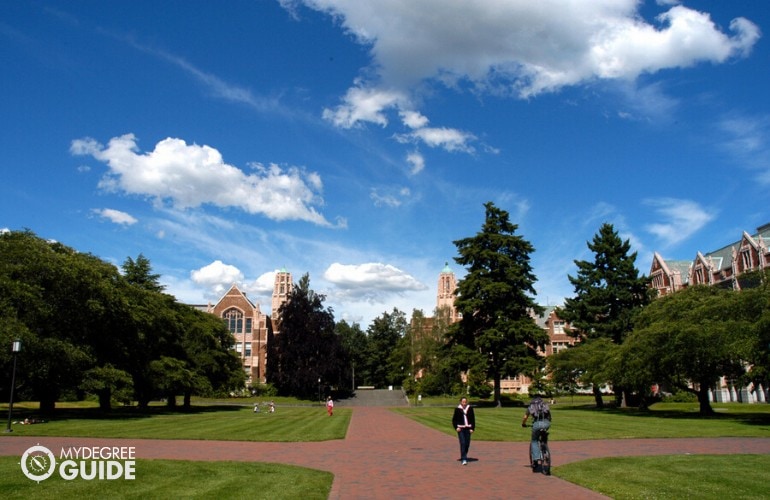
When choosing a doctoral degree program, it is important to find out if universities you’re considering are accredited by a regional accrediting organization .
To be accredited, a college or university must prove that they are meeting their mission through their programs and services and maintaining academic rigor and integrity. To prove this, institutions must engage in a consistent process of self-assessment and continually seek to improve themselves.
Accreditation often speaks to the quality of a college or university. Because doctoral programs are such an investment of time and funds, you may want to make sure that the university you choose is well-respected.

Financial Aid and Scholarships

Student loans are usually available for doctoral students who qualify. Students seeking these opportunities will need to complete the Free Application for Federal Student Aid (FASFA) .
Your chosen university may also have scholarships and grants available that you may be eligible to apply for. Unlike a loan, grants and scholarships do not need to be paid back, so they are the most cost-effective funding opportunity to inquire about.
Many graduate students find that they are able to fund their education through a mix of loans and scholarships or grants. Cost and funding are important factors to consider when choosing your degree program, so it’s always advisable to inquire about funding opportunities early on in the admissions process.
What Can You Do with a Special Education Doctorate?

A doctoral degree in special education can prepare you to be a leader in the education field. You may qualify to be an administrator, teacher, professor, or researcher.
In a school system, you may be a school principal, curriculum designer, or special education department supervisor. In higher education, you may be a professor or administrator of academic or student affairs.
Your career may also lead you to a position as an educational researcher for a private organization or to a leadership position at a human services nonprofit.
How Much Does an Online PhD in Special Education Cost?

Although tuition rates vary, you can expect to pay between $450 and $595 per credit hour when pursuing a doctorate in special education.
Cost and how you can fund your degree are always critical factors to consider when selecting your degree program. It’s advisable to complete the FAFSA and ask your university about scholarships or grants.
A doctoral degree is an investment in yourself that may be reflected in your career, earning potential, and personal fulfillment. It’s important to weigh the cost of the degree against the potential rewards of successfully completing the program.
How Long Does It Take to Get a PhD in Special Education?

A doctoral degree is a significant time commitment because it prepares students to be experts in their field, requiring much training and preparation.
EdD and PhD programs typically require 60 to 90 credits of coursework, including either your dissertation or capstone project, and usually take 3 to 5 years to complete. If you already have a masters degree in education, you may have the opportunity to transfer in credits, shaving some time off of your doctoral degree.
Some programs require applicants to hold a masters degree and may require fewer credits than programs designed for students with a bachelor’s degree only. So there is variance among programs in terms of credit requirements and time to completion.
What’s the Difference Between an EdD vs. PhD in Special Education?

While different in overall focus, EdD and PhD programs will be similar in their course offerings because students in both programs need to have a strong base of knowledge in special education.
An EdD in Special Education online program is focused on preparing students to be practitioners in the special education field. The program prepares people to work directly in the field for a school or institution of higher education, identifying and solving problems to make their services better.
While the PhD may also qualify you to be an educator or educational leader, a PhD in Special Education online program is more focused on conducting research in order to drive new information to the field. Someone holding a PhD might conduct the research that will inform the practical decisions made by those in leadership roles in education.
Most PhD programs still require a dissertation. When it comes to EdD programs, though, students are often given the option of completing a capstone or similar final project in lieu of a dissertation.
Is a Special Education Doctorate Worth It?

Yes, a doctorate in special education is worth it for many students. According to the Bureau of Labor Statistics, education, training, and library jobs are set to grow at 5% over the next 10 years, faster than the average for all occupations.
Common careers for someone holding a doctorate in special education include school principal, instructional coordinator, special education department supervisor, college or university professor, and higher education administrator.
There are many benefits to a leadership role in special education. With a doctoral degree, you will gain the research, problem-solving, and teaching skills necessary to lead the field in directions that will have positive impacts on a wide array of learners.
Getting Your EdD or PhD Online

If special education is your passion and you want to be a thought-leader in the field, then an EdD or PhD in Special Education may be the right path to consider. Even if you have work or family obligations that prevent you from attending a traditional program, there are regionally accredited programs that offer the convenience of a 100% online degree.
Special education is an incredibly important field that is in need of leaders who are strategic and innovative. By obtaining a doctorate in this field, you may have a positive impact on many students’ lives through research and policy.


- Recommendations
- Notifications
- My Favorites
Favorites, recommendations, and notifications are only available for UCLA Graduate Students at this time.
Access features exclusively for UCLA students and staff.
As a student, you can:
- Add funding awards to your favorites list
- Get notified of upcoming deadlines and events
- Receive personalized recommendations for funding awards
We're Sorry
You've signed in with a UCLA undergraduate student account.
UCLA Graduate Programs

Graduate Program: Special Education
UCLA's Graduate Program in Special Education offers the following degree(s):
Doctor of Philosophy (Ph.D.)
With questions not answered here or on the program’s site (above), please contact the program directly.
Special Education Graduate Program at UCLA 1009 Moore Hall Box 951521 Los Angeles, CA 90095-1521
Visit the Special Education’s faculty roster
COURSE DESCRIPTIONS
Visit the registrar's site for the Special Education’s course descriptions
- Admission Requirements
- Program Statistics
(310) 825-8326
MAJOR CODE: SPECIAL EDUCATION
- Student Support
- StudentInfo

- Departments & Programs
- Special Education
- Special Education Program
Special Education, Ph.D.
The doctoral program in Special Education offers advanced study across all disabilities. Doctoral students are individually mentored by faculty who are nationally and internationally recognized experts in their fields and who actively engage in cutting-edge research, collaboration with schools and public agencies, developing public policy, and advocating for individuals with exceptionalities and their families.
Graduates of the Special Education doctoral program have held positions as university professors, deans, researchers, clinicians, school and community organization administrators, lawyers, policy experts, and government agency leaders.
Interested in earning a Transcripted Graduate Certificate within a Doctoral Degree to develop a focused area of expertise?
- Applied Behavior Analysis Certificate
- Autism Spectrum Disorder Certificate
- Educational Diagnostician Program
Contact Professor Cathy Qi, PhD to discuss your interest in the doctoral program: Dr. Cathy Qi, [email protected] or 505 277-4452 will suggest two to three other faculty with whom to talk who are an appropriate match with the applicant’s professional goals and research interests.
Application Deadlines
Application Deadline for Domestic Applicants: Rolling Admissions
Application Deadline for International Applicants: Spring Semester Priority: May 1 (for scholarship consideration)
Summer Semester Domestic Applicants: March 1 International Applications: Dec. 1
Fall Semester Priority: March 1 (for scholarship consideration) Final: May 1 Post-offer materials: Must be received June 1
- Office of Graduate Studies
- Global Education Office
- Financial Aid
Cathy Qi, PhD Professor, Special Education 505 277-4452 [email protected]
Special Education Graduate Programs Coordinator 505-277-5018 [email protected]
What you can do with an Ph.D. degree in SPCD?
A doctoral degree in Special Education prepares individuals to become
- University or community college professors and administrators
- Researchers in academic or clinical settings
- Administrators in school districts or community agencies that serve individuals with disabilities
- Leaders in government agencies and public policy organizations
Rolling Admissions, apply when you are ready! Reach out to Special Education faculty now to start your degree planning process as additional deadlines, such as for international admissions or applications for scholarships, might factor into your planning.
Application Process
- Contact Professor Susan Copeland, PhD to discuss your interest in the doctoral program: Dr. Susan Copeland, [email protected] or 505 277-0628 will suggest two to three other faculty with whom to talk who are an appropriate match with the applicant’s professional goals and research interests.
- A non-refundable application fee (pay with credit card online as part of Graduate Application)
- One official transcript from each college you have attended. Official transcripts must be sent to Office of Admissions. (Exception: UNM transcripts)
- Letter of Intent
- SPCD Doctoral Application form . Please upload completed form in the special requirements section in your online application. May also be added to addendum section in your online application after submission.
- Professional Vita (Resume)
- Professional Writing Sample
- Five Letters of Recommendation
Connect with Us
- UNMCOEHS on Facebook
- UNMCOEHS on Twitter/X
- UNMCOEHS on Instagram
- UNMCOE on Snapchat
- UNMCOE on Vimeo
- UNMCOE on iTunes U
Get in Touch
COEHS Dean's Office (505) 277-2231 [email protected]
Center for Student Success COEHS Advisement (505) 277-3190 [email protected]
COEHS Field Services [email protected]
Help / Contact Us
Parking at COEHS
Website Update Requests
UNM Resources
- UNM Home page
- UNM Directory
- UNM Accessibility Services
- UNM Libraries
CAEP Accreditation
- Request for Third Party Comments for CAEP Accreditation
Faculty & Staff Resources
- COEHS Directory
- COEHS Research
- COEHS Help Desk
- COEHS Intranet
- COEHS Faculty & Staff Resources
- COEHS Data Request Form
Student Resources
- Apply to the College of Education & Human Sciences
- Center for Student Success
- COEHS Scholarships
- District Partner Teacher Residencies (DPTR)
- Student Advisement
- Student Leadership & GSLA
- SafeAssign Academic Tool
- Student Learning & Licensure (SLL)
- Educator Preparation Programs Teacher Candidate Continuation Policy
- Field Experiences Handbook

© The University of New Mexico Albuquerque, NM 87131, (505) 277-0111 New Mexico's Flagship University
- UNM on Facebook
- UNM on Instagram
- UNM on Twitter
- UNM on YouTube
more at social.unm.edu
- Accessibility
- Contact UNM
- Consumer Information
- New Mexico Higher Education Dashboard
Ohio State nav bar
The Ohio State University
- BuckeyeLink
- Find People
- Search Ohio State

PhD in Educational Studies, Special Education
As a doctoral student in special education you will use research to help improve the lives of children, youth and adults with disabilities as you prepare to become a leader in the field. The full-time PhD program in special education at The Ohio State University is designed to prepare leaders in research, teaching and service. In our accreditated program, you will develop competencies in conducting applied research, writing for publication, advanced applied behavior analysis, college teaching and service to the profession and community.
Specializations
In consultation with their faculty advisor, students will identify an area of specialization. Examples of specialization include, but are not limited to, applied behavior analysis, intellectual and developmental disabilities, d/Deaf and hard of hearing, high-incidence disabilities, and gifted education.

ABAI Accredited PhD Program Information
Frequently Asked Questions
The PhD program in Special Education is designed to prepare leaders in research, teaching and service for faculty positions in colleges and universities and for other positions in behavioral clinics or agencies in the communities. In our accredited program, you will develop competencies in conducting research, writing for scholarly publications, using advanced applied behavior analysis and college/university teaching. Doctoral students will obtain a range of expertise in research paradigms and use this knowledge to help improve the educational and social lives of children, youth and adults with disabilities in societies. Our committed faculty will work closely with candidates to prepare them for their future professional careers.
How is instruction delivered?
In general, the instructional delivery mode is in-person or face-to-face. There are a few online distance education courses. Students may enroll in individual study credits with their advisors to work on research projects or to prepare for candidacy exams. All students need to complete a dissertation under the guidance of a faculty advisor. Dissertation credits entail individualized meetings between students and advisors.
How long will it take me to complete the program?
The program admits full-time and part-time students. Full-time students can complete the program in 3 ½ to 4 years. The completion time for part-time students varies, however, part-time students should enroll in a minimum of 3 credits per semester. After a successful candidacy exam, all students enroll in a maximum of 3 credits until the completion of the dissertation. There is a required minimum of 6 dissertation credits.
Will I get a job?
Not only is there a teacher shortage in K-12 school settings, but also, there is a need for faculty in higher education settings and even in agencies that serve individuals with disabilities. Graduates should be able to secure a position in comprehensive research institutions (R1), universities with teacher-preparation programs and governmental and service agencies.
What experiences outside the OSU classroom can I expect to have?
All doctoral students are expected to deliver presentations at refereed professional organizational meetings and conferences. Students may have the option of working alongside with faculty on faculty’s research projects, providing them with experience in designing and conducting investigations. Students may also collect data on children and adolescents with disabilities in the schools for their own research projects, including dissertations. Individuals with Graduate Teaching Associateships may supervise undergraduate students in pre-student teaching and student teaching endeavors. There may also be opportunities to teach class sessions or an entire undergraduate course. Students are strongly encouraged to join the student chapters of professional organizations associated with their specialty area (e.g., Association for Behavior Analysis International, Association of College Educators—Deaf and Hard of Hearing, Council of Exceptional Children, International Dyslexia Association, and The Association for Gifted Children).
How will my own interests be addressed?
The SPED doctoral program is flexible to accommodate a range of interests. Students are typically matched with faculty advisors, who have similar or related research interests. Students and advisors work together to develop a program plan that fits the future professional goals of the students. Individuals can decide on a research topic and the manner in which the topic can be investigated (i.e., questions, methodology, research design, etc.).
Who teaches the courses I will take?
SPED doctoral courses are taught by SPED faculty with expertise in the various content areas such as behavioral strategies, inclusion and diversity, instructional methods, language and literacy development, paraprofessional training, research paradigms, transition and more. SPED faculty have also conducted research in their instructional areas, making it easy for students to see the connections between research and evidence-based practices. Students are also required to take department-wide and research courses taught by non-SPED faculty to foster a general community of scholars and to understand and appreciate the diversity of instructional and research perspectives.
What student-centered activities can I join?
There are a number of clubs, organizations, and related gatherings at Ohio State for graduate students. Find your niche at the OSU student organization site .
Is there any financial support for me?
The College offers scholarships for newly-admitted and continuing graduate students, who have qualified credentials and a financial need. Several of these scholarships are geared toward individuals in special education programs. There may be graduate associateship positions (Graduate Teaching Associateship or Graduate Research Associateships) available at the Department or Program level. Individuals should apply for these funding opportunities, which are made public during the admission process.
The SPED faculty is a dedicated group, who desire to facilitate the development of competent scholars, are exposed to and acquire evidence-based practices and critical-thinking skills. Members of the SPED faculty have received several national and international awards and are actively engaged in on-going research and scholarship. The faculty is accessible and committed to contribute to the professional development of students, enabling them to achieve their future professional goals.
Career Paths

Funding Options

Key to teaching, research and learning in the college, associateships provide students with professional experience and financial support.

These financial awards are made by Ohio State to students based on academic merit through a university-wide competition.

The college annually awards scholarships to its students to support their academic goals.
Degree Requirements
Prerequisites
Master's degree
Minimum Program hours
Deadline to apply
December 1
Program start
Autumn Semester
View Special Education (EDUCST-PH, SPE) Curriculum Sheet
Apply to Ohio State
Apply Now
Application checklist
View application checklist
School Finder
Best doctorate in special education degrees online: students before profits.
Those who want to attain the highest level of education as it pertains to special education should consider an online doctorate in special education degree. Through this type of degree program, students will learn the skills and competencies that will allow them to fill leadership and administrative roles in educational organizations. Students will be prepared to lead entire special education programs and design curriculum that serves the students within such a program. By pursuing this type of program online, students are able to save money and gain a greater measure of flexibility over their learning schedule.
If you are trying to find the best doctorate in special education degree programs online, we have compiled a list of our top choices. All of the programs in this ranking have all been accredited by nationally-recognized accreditation boards and have had their nonprofit status verified through the school’s official website. These rankings are ordered from highest to lowest score based on the affordability of their tuition and how quickly the program can be completed.
Featured Programs
Note that tuition rates listed below are based on cost per credit, and individual programs may have additional fees.
Ranking the Top Doctorate in Special Education Online Programs
#1. liberty university, online doctor of philosophy in education – special education, lynchburg, virginia.

Students at Liberty University are able to enroll in the school’s online doctorate in special education degree. Offered entirely online, the Online Doctor of Philosophy in Education – Special Education was created to provide students with the expert-level training needed to work in special education. Students in this program will learn valuable skills including teacher preparation, educational management skills, and more. By earning this program of study, students will be ready for any type of career in special education. This program takes a total of three years for students to complete and requires a total of 60 credit hours for its completion.
Tuition: $35,700
#2. Slippery Rock University of Pennslyvania
Online doctor of education with a concentration in special education, butler county, pennsylvania.

Slippery Rock University of Pennslyvania offers its students an online doctorate in special education degree. Students who choose to pursue the Online Doctor of Education with a concentration in Special Education will receive the highest level of education and training needed for leadership positions in educational organizations. By choosing the Special Education concentration, students will learn the skills needed to design and administer special education curriculum. Offered mostly online, courses in this program are given both asynchronously and synchronously. Students are required to attend in-person weekend courses during the summer. To complete this program, students must complete a total of 60 credits.
Tuition: $38,700
Score: 99.75
#3. Grand Canyon University
Online doctor of education in organizational leadership with an emphasis in special education, phoenix, arizona.

The Online Doctor of Education in Organizational Leadership with an Emphasis in Special Education degree is offered to students by Grand Canyon University. This online Doctor of Special Education degree is designed for students who want to further their education in educational leadership as it pertains to the administration of special education curriculum. By completing this program, students will be prepared for careers as school administrators, lead special education teachers, special education consultants, and much more. Courses in this program include Special Education Law, Ethical Dilemmas and Stewardship, and many others. A total of 60 credit hours must be completed for students to earn this degree.
Tuition: $39,000
Score: 99.5
#4. University of Colorado Denver
Online doctor of education, leadership for educational equity with a concentration in early childhood special education, denver, colorado.

Offered mostly online, students at the University of Colorado Denver can enroll in the school’s Online Doctor of Education, Leadership for Educational Equity with a concentration in Early Childhood Special Education degree. This online doctorate of special education degree was created to train students with the specific skills needed to work with young special needs students. After completing this program of study, students will be able to step into administrative and leadership roles. Within these roles, students will be able to develop programming designed to help students with special needs. This program is offered with online courses and some in-person classes. To complete this degree, students must earn a total of 54 credits.
Tuition: $39,474
Score: 99.25
#5. Texas Tech University
Doctorate in special education online programs, lubbock, texas.
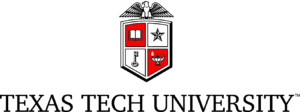
Texas Tech University currently offers its Doctor of Philosophy in Special Education degree entirely online. This online doctorate of special education degree is designed for students who wish to step into leadership roles to help shape special education programs. Students will learn how to research, develop, and evaluate different teaching programs. By completing this program, students will have developed the different competencies required to work as special education consultants or other leadership roles in special education. Texas Tech University offers this program entirely online and does not require students to visit their campus during the program. A total of 90 credits are needed to complete this program of study.
Tuition: $41,850
#6. University of Toledo
Online doctor in curriculum and instruction – special education, toledo, ohio.
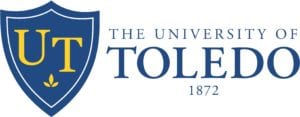
The Online Doctor in Curriculum and Instruction – Special Education degree is offered to students by the University of Toledo. This online doctorate of special education degree is designed to be completed over the course of four to five years. During this program of study, students will be trained for a variety of leadership positions in educational organizations. After completing this degree, students will be in a position of being able to enter into a variety of different organizations to shape their special education curriculums. To complete this program of study, students must earn a total of 70 credit hours. The University of Toledo also offers a virtual internship component to this degree that allows students to gain insight and experience from those already working in the field.
Tuition: $44,800
Score: 98.75
#7. Northcentral University
San diego, california.

Students at Northcentral University can enroll in an online doctorate of special education degree offered by the school. Called the Online Doctor of Education in Special Education degree, this program of study trains students with all the necessary information needed to effectively support students with special needs as outlined by the Individuals with Disabilities Education Improvement Act. After completing this degree program, students will be ready to begin careers as school district administrators as well as administrators of special education programs. Northcentral University estimates that a total of 40 months are needed to complete this program. Students must earn 48 credits to graduate with this degree.
Tuition: $45,696
Score: 98.5
#8. Hampton University
Online doctor of philosophy in educational management with a specialization in special education, hampton, virginia.

Hampton University offers its students the opportunity to enroll in their Online Doctor of Philosophy in Educational Management with a specialization in Special Education degree. This online doctorate in special education degree is focused on helping students understand the skills needed to properly manage an educational facility or organization. They will learn how to become effective leaders alongside the various rules and information to help students with special needs succeed. This program at Hampton University is designed to be completed in 2.5 years. Students must earn a total of 66 credits to be eligible for graduation from this degree.
Tuition: $45,870
Score: 98.25
#9. University of Northern Colorado
Greeley, colorado.

Offered through the school’s Extended Campus, students can choose to enroll in the University of Northern Colorado’s Online Doctorate in Special Education degree. This online doctorate in special education degree will ready students to become advocates and leaders as they shape the future of special education. Courses in this program include Law of Exceptionalities, Research in Exceptionalities, and much more. If pursued as a full-time student, this program can be completed in as little as three years. Students who pursue this degree part-time are expected to complete it in five years. To complete this program of study, students must complete a total of 77 credit hours.
Tuition: $48,510
Score: 98
#10. Concordia University Chicago
Online doctorate in education leadership – special education, chicago, illinois.

Concordia University Chicago’s online doctorate in special education is designed to be completed entirely online. The Online Doctorate in Education Leadership – Special Education degree was created to help students develop the skills needed to be a leader in special education. Students will be tasked with understanding the weight of being an advocate for students with special needs to better understand how to properly educate these students. Courses in this program include International Perspectives in Special Education, Special Education Law and Policy, and much more. To complete this program of study, students must earn a total of 61 credits.
Tuition: $48,910
Score: 97.75
#11. Gwynedd Mercy University
Online doctorate in education: leadership in special education, gwynedd valley, pennsylvania.

The Online Doctorate in Education: Leadership in Special Education degree is offered to students at Gwynedd Mercy University. This online doctorate in special education degree was created to help students understand the various skills needed to work as a leader in education. Students will study curriculum development, education policy, community relations, and more. Learning how to properly manage faculty and staff, students will have gained the many skills needed to lead a special education program. Offered in an accelerated format, students can complete this program of study in as little as three years. Students must complete a total of 54 credit hours to complete this program of study.
Tuition: $52,110
Score: 97.5
#12. St John’s University
Online doctorate in literacy with a special education specialization, queens, new york.

Students at St. John’s University can enroll in the school’s online Doctorate in Literacy with a Special Education specialization. This program of study is created to help work with special needs populations to promote literacy among them. Students will learn how to work with students, teachers, and administrators in order to help implement policy and programs that can be used to help these groups succeed. Courses in this program of study include Literacy Leadership, Foundations of Literacy Inquiry and Professionalism, and many more. As a specialization of the Doctorate in Literacy, students will also take courses in Applied Behavior Analysis. To graduate from this program, students must earn a total of 60 credit hours.
Tuition: $53,130
Score: 97.25
#13. Ball State University
Muncie, indiana.

Ball State University offers its students an Online Doctor of Special Education degree to its students. Able to be completed mostly online, this program of study is designed for students who wish to pursue leadership or administrative roles in education. Students can choose from six different concentrations including Applied Behavior Analysis and Autism, General Special Education, and Teaching and Learning – Emotional and Behavioral Disorders. While the majority of the courses are offered to students online, students are required to visit the Ball State University campus at certain points throughout the curriculum. To graduate from this program, students must earn a total of 90 different credit hours.
Tuition: $55,440
#14. Regent University
Online doctorate special education, virginia beach, virginia.

Students at Regent University can select the school’s Online Doctorate in Special Education degree. This online doctorate in special education degree can be completed almost entirely online except for a number of 4-day residences required throughout the program. Accredited by the Council for the Accreditation of Educator Preparation, this program will prepare students to work as special education administrators who oversee special education programs for a variety of different organizations. Courses in this degree program include Issues in Education, History of Special Education, International Special Education, and much more. Students must earn a total of 77 credits to complete this program of study.
Tuition: $58,125
Score: 96.75
#15. Endicott College
Online doctor of philosophy in applied behavior analysis, beverly, massachusetts.

The Online Doctor of Philosophy in Applied Behavior Analysis degree is designed by Endicott College to help students to learn one of the leading ways to work with those with developmental disabilities in an educational environment. This online doctorate of special education provides students with specialized education in understanding applied behavior analysis in order to help students with special needs. Using a variety of different scientific methods, students will develop intervention programs for students with autism and many other developmental disabilities. After completion of this program, students will be ready for a variety of leadership roles in special education. A total of 60 credit hours are required for the completion of this program.
Tuition: $63,640
Score: 96.5
#16. Nova Southeastern University
Broward county, florida.

Nova Southeastern University offers its students an online doctorate in special education degree that can be pursued online. Accredited by the National Council for Accreditation of Teacher Education, the Online Doctor of Education with a concentration in Special Education degree can help prepare students with the knowledge needed to work in leadership positions in education to help special needs students succeed. Courses in this program include Special Education Law and Policy, Seminar in the Nature of Students with Autism Spectrum Disorder, and much more. To complete this program of study, students are required to earn a total of 54 credits.
Tuition: $71,820
Score: 96.25
#17. Drexel University
Online doctorate in educational leadership and management with a concentration in special education leadership, philadelphia, pennsylvania.

Students at Drexel University are able to enroll in the school’s online doctorate in special education degree. Called the Online Doctorate in Educational Leadership and Management with a concentration in Special Education Leadership degree, this program of study will prepare students with the skills needed to enter into leadership and administrative positions in educational organizations. Able to be completed in as little as three years, this program is designed to be completed entirely online and does not require a residency component. Courses in this program include School Law & Policy in Special Education, Organization & Administration of Special Education, and much more. A total of 60 credits are required to complete this degree.
Tuition: $75,900
#18. West Virginia University
Online doctor of education program with major in special education, morgantown, west virginia.

West Virginia University offers students the opportunity to enroll in an online doctor of education with a major in special education. Students in this program of study will focus on becoming leaders in special education by learning how to be effective advocates for special needs students. They will learn how to design, implement, and evaluate special education curriculums. Upon completion of this degree, students will be ready for careers in leadership within education. This program of study has been accredited by the National Council for Accreditation of Teacher Education. Students in this program must earn a total of 72 credits to complete this degree.
Tuition: $103,104
Score: 95.75
#19. University of Idaho
Online doctor of education – special education, moscow, idaho.

The Online Doctor of Education – Special Education degree is offered to students by the University of Idaho. This online doctor of special education degree will prepare students for roles as leaders and administrators in special education. This particular program of study has students focusing their efforts on studying Autism Spectrum Disorders and other related disabilities. Students are able to pursue this degree program full-time or part-time depending on their own scheduling limitations. By completing this degree, students will be ready for a variety of different leadership roles in education. Students must earn a total of 84 credits.
Tuition: $125,196
Score: 95.5
#20. University of Pittsburgh
Pittsburgh, pennsylvania.

The University of Pittsburgh offers students the opportunity to enroll in the school’s Online Doctor of Education – Special Education degree. This online doctorate of special education degree is offered to students mostly online. Students are required to visit campus at certain points throughout the pursuit of this degree program. By completing this degree, students will have gained the skills needed for leadership in special education. Students will be able to evaluate and implement special education curriculums designed to meet the needs of students of all types. To complete this program of study, the University of Pittsburgh requires a total of 90 credits for graduation.
Tuition: $142,470
Score: 95.25
Online Associate’s Special Education
Online Bachelor’s Special Education
Online Master’s Special Education
This concludes our ranking of the top doctorate in special education degrees online.
- 10 Best Online Doctorates at Nonprofit Colleges
- Top 10 Nonprofit Online Colleges in Georgia
- Online Bachelor’s in Computer Science
- Top 10 Nonprofit Online Colleges in Virginia
- DIFFERENT TYPES OF LEGAL STUDIES DEGREES
- 15 Best Paying Jobs in Energy
- 10 Top Organizational Leadership Jobs by Salary
- Top 10 Affordable Online Colleges in NYC
Infographics
- How To Focus Despite Distractions
- Online College Enrollment: By the Numbers
- Most Profitable Non-Profit Organizations
- College Tuition Around the World
- Alumni & Giving
- Faculty/Staff Directory

The Graduate School of Education and Human Development
- Accreditation
- Faculty & Staff Directory
- Counseling & Human Development
- Curriculum and Pedagogy
- Educational Leadership
- Human and Organizational Learning
- Special Education and Disability Studies
- Individualized Master's Program
- PhD in Education
- Online Programs
- Prospective Students
- Request Info
- How to Apply
- International Applicants
- Funding Your Education
- Admissions Events
- Visit Campus
- Admitted Students
- Career Services
- Student FAQs
- Dates & Deadlines
- New Student Orientation
- New Student Guide
- Research Lab
- UNESCO Chair & Fellowship
- Futrell Scholars
- EdFix Podcast
- Feuer Consideration
- Refer a Student
- Fellowship and Summer Institute on Antisemitism & Jewish Inclusion in Educational Settings

Education Specialist in Special Education Leadership
Lead the Way in Creating an Equitable and Inclusive Education System
We're excited to announce our newest program, Education Specialist in Special Education Leadership, that combines the core components of GSEHD's esteemed and accredited Educational Leadership and Administration and Special Education doctoral programs. If you're a special educator seeking educational administration licensure, or an educational leader looking to develop critical skills to lead as an advocate for students with disabilities, this program is ideal to help you meet your career goals. Designed for aspiring leaders, you will gain advanced skills and knowledge needed to drive change, advocate for inclusive education, and make a lasting impact on students with special needs.
With the first cohort starting courses in 2025, request information now to join a community of passionate educators dedicated to excellence and innovation, and step into a role where your leadership can truly make a difference.
Request Information
How to Apply
Upcoming Info Sessions

Hands-On Learning Opportunities Through internships, team-based projects, engagement with current special educators and educational leaders, and individual assignments, students will gain hands-on experiences in schools and opportunities to reflect and think critically about those experiences as they connect research and theory to practice.
Collaborative Research Students have a unique opportunity to work alongside SEDS faculty, who are nationally recognized researchers in the field, on funded research projects, resulting in a wide range of experiential learning outcomes, such as presenting at conferences and co-authoring research publications.
Convenient Schedule Courses are scheduled once a week in late afternoons and evenings (Monday-Thursday) to accommodate the schedules of working professionals, and for internship experiences.
The GW Advantage
Students learn from faculty who are engaged in both research and practice in the fields of special education and disability studies, as well as educational leadership and administration. Faculty members have a fervent commitment to student learning and development, along with rigorous expectations of students to advocate for and equitably serve all students.
Jump to Section: Curriculum | Admissions | Fees & Aid | Careers | Faculty | Events | Request Info

Program at a Glance
Department:.
Special Education & Disability Studies
Course Delivery:
-Online -Main Campus
Program Entry:
The mission of the doctoral program in the Department of Special Education and Disability Studies Department (SEDS) is to prepare scholars and leaders who can translate and determine the appropriate application of research at the school, local, and federal levels for people with disabilities. In other words, scholars draw from findings in developmental science, disability studies, and intervention research practices to develop and implement equitable, inclusive practices for students and adults with disabilities. Our mission is to prepare doctoral candidates for leadership roles in special education and related fields with a strong foundation in developmental science and strength-based, inclusive pedagogy.
The program will not lead to special education licensure, but will provide the student the necessary coursework to apply for a state educational administrator license.
Graduates will be prepared for leadership roles in universities, systems, programs, and academic settings serving children and families from diverse backgrounds.
Upon completion of the program, students will be able to:
- Demonstrate knowledge of the developmental sciences and developmental processes as they relate to typical and atypical child and adolescent development.
- Understand and appropriately use knowledge, data, and evidence to inform decision making and research.
Translate research findings into practical knowledge, policy development, and strategies for developmental and educational interventions and future studies.
Design and lead learning for school improvement.
Make decisions about and manage necessary operations and allocate resources for school improvement and change.
Build and foster a collaborative school community.
Understand the social, legal, and political context of education and their communities and use these systems to advocate for change.
Describe and demonstrate visionary and ethical leadership.
Innovate to lead change in their school environments and in larger educational organizations.
Promote and demonstrate equity, engagement, and excellence in education.
Appraise and demonstrate theoretical and practical aspects of instructional and operational leadership.
Analyze and demonstrate building capacity of self and the learning community.
- Guide to Applying
- Admission Requirements
- Application Deadlines
GSEHD’s Office of Admissions invites you to apply for a spot in our program. Please review the following admission and financial information. Ready to take the next step in your career? Review our step-by-step guide to applying to GSEHD > To learn more about the program, admission process, and upcoming events, please connect with the GSEHD Admissions Team at [email protected] or 202-994-9283.
To be considered for admission, applicants must submit the online application form as well as the following required supporting documents. There is no application fee.
Prerequisite: Master's Degree and at least one year of experience in education
- Statement of Purpose
- 2 Letters of Recommendation
Transcripts from all previously attended colleges or universities
Interview with a special education faculty member
*Additional application requirements may exist for international applicants .
View more details about requirements
Applications are now being accepted for Fall 2024. We encourage you to apply as early as possible.
For more information or to inquire about the next admissions cycle, contact the GSEHD Admissions Team at [email protected] or 202-994-9283.
Tuition & Financial Aid
- Tuition Overview
We know embarking upon graduate school is a big decision - due in part to the costs of attending. At GW, we understand the time and thought behind making graduate school work for you. Please take a moment to learn more about the options and opportunities available to help fund your graduate education.
Learn more about scholarships, grants & financial aid
Graduate tuition is charged per credit hour, unless otherwise noted. Rates vary by program and location.
The tuition rate* for the off-campus EdS in SpEd Leadership program is $970 per credit hour .
The tuition rate* for the online EdS in SpEd Leadership program is $1,000 per credit hour .
This program requires 30 credits .
Please note: Additional fees may apply for international students, late fees, etc. Current tuition rates may be updated during the year.
*Summer 2024, Fall 2024 and Spring 2025
View the current fee chart
Scholarships are available to eligible admitted students. Review eligibility requirements and learn more about funding your education >
Career Outlook
Graduates are prepared to have an impact through leadership in academic settings, research communities, policy institutions, and advocacy organizations. You will become a leader, innovator, and change agent in the field of special education. Roles typically involve leadership, strategic planning, and a deep understanding of both educational theory and special education practices.

An Education Specialist (Ed.S.) degree in Special Education Leadership can open doors to various advanced career opportunities in the field of special education. Here are some potential career paths:
Special Education Administrator : Oversee special education programs within schools or districts, ensuring compliance with laws and regulations, managing staff, and developing policies.
Director of Special Education : Lead and coordinate special education services at the district or state level, focusing on program development, budgeting, and policy implementation.
Special Education Coordinator : Work at the school or district level to support special education teachers, facilitate Individualized Education Programs (IEPs), and ensure that students receive appropriate services.
Instructional Coach for Special Education : Provide professional development and support to special education teachers, helping them implement effective teaching strategies and interventions.
Consultant : Offer expertise to schools, districts, or educational agencies on best practices in special education, program evaluation, and compliance with federal and state regulations.
University Faculty : Teach courses and conduct research in special education and educational leadership at the college or university level.
Educational Diagnostician : Assess students’ educational needs, develop IEPs, and work with teachers and parents to support students' learning.
Policy Analyst : Work with government agencies, think tanks, or advocacy organizations to develop and analyze policies affecting special education.
Program Director for Nonprofit Organizations : Lead initiatives focused on supporting individuals with disabilities, including program development, advocacy, and community outreach.
Behavior Specialist : Develop and implement behavior intervention plans for students with challenging behaviors, working closely with teachers, parents, and other professionals.

- Universities or Colleges
- PreK-12 Educational Settings
- Policy Think Tanks
- Research Organizations, Centers, and Institutes
Special Education (EdD) Faculty
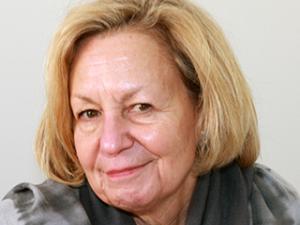
Associate Dean for Research and External Relations; Director of Accreditation; Professor, Special Education and Disability Studies

Assistant Professor, Special Education and Disability Studies
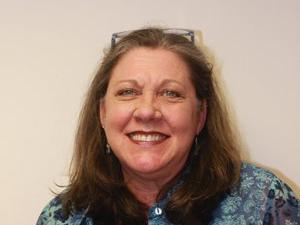
Associate Professor, Special Education and Disability Studies

Department Chair and Associate Professor, Special Education and Disability Studies
Upcoming Events
Program info sessions.
Schedule a Meeting to Learn More
GSEHD Student Events
View All Events
Request Information
- Curriculum and Instruction Master's
- Reading Masters
- Reading Certificate
- TESOL Master's
- TESOL Certificate
- Educational Administration Master’s
- Educational Administration Certificate
- Autism Master's
- Autism Certificate
- Leadership in Special and Inclusive Education Certificate
- High Incidence Disabilities Master's
- Secondary Special Education and Transition Master's
- Secondary Special Education and Transition Certificate
- Virtual Learning Resources
- Frequently Asked Questions
- Video Gallery
- Financial Aid
Exploring special education teacher certification: Requirements and exam preparation

The teacher shortage is real and students with disabilities, including those in less wealthy and rural districts, are often the most impacted.
Take the case of Nico Mossa, a seventh-grader with disabilities in Wake County, N.C.
Nico is a fun-loving kid with autism and a seizure disorder who requires necessary accommodations. 1 However, when school started in July 2023, his class didn’t have a qualified special education teacher for five months.
While the district launched a search to fill the position, his mom worried that mandated services, which were outlined in his individualized education plan (IEP), were not being implemented. If Nico had a seizure in class, there was no guarantee the instructional aide or substitute assigned to his class would know where to find his medication or how to administer it.
Additionally, the certified special ed teacher next door had to juggle lesson planning responsibilities, their class, and Nico’s class—which resulted in a fragmented learning experience for students. 1
In this guide, we cover the career outlook for special education teachers. You will also learn about the steps to obtain special education certification, including exams and state requirements.
Career Opportunities
The career outlook for special education teachers is exceptionally promising, as indicated by the U.S. Bureau of Labor Statistics which projects around 33,500 new job openings between the years 2022 and 2023. 2
However, experts emphasize that this estimate may be conservative, given the demand; the United States currently serves over seven million students requiring special services or accommodations, highlighting a significant need for skilled special education professionals. 3,4
Although some challenges exist, including financial support gaps in certain states, the overall trend is toward increased awareness and early identification of disabilities, leading to a foreseeable surge in the demand for qualified special education teachers. 4
This growing recognition of the importance of special education services is paving the way for exciting opportunities in this rewarding field.
Unlocking the path: Essential steps for special education certification
Embarking on a career in special education is a profound commitment to empowering lives and shaping futures.
The journey to becoming a certified special education teacher requires dedication, compassion, and hands-on training.
Individuals who join the profession often teach the same cohort of students for multiple years and find they develop positive relationships with their students, families, caregivers, and community.
The importance of special education teachers like Brian Skinner
By the time students land on special education teacher Brian Skinner’s caseload, they have often convinced themselves they cannot excel at subjects like reading and math and decide to give up.
As 2023 Kansas Teacher of the Year, Skinner is driven to instill a belief that his students can succeed, and they do. 5
If you pursue a path toward special education certification, you, too, can become a champion of educational equity for students with special needs. Through advocacy, specialized instruction, and interventions, you will be able to create inclusive learning environments where your students will thrive. 6
Your role could include various settings, from resource rooms to mainstream classrooms where special education and regular students learn together. Crafting Individualized Education Programs (IEPs) under federal laws like the Individuals with Disabilities Education Act (IDEA), you'll ensure each student receives a free, appropriate education tailored to their needs. For instance, a student with ADHD might get extended time on learning activities or a modified exam. 1
Types of special education certifications
Because your students’ needs will vary greatly, you’ll want to consider gaining additional expertise in the areas you want to impact most.
Many online master’s degree programs offer specializations in areas, such as autism spectrum disorders or transition services for graduating students with disabilities.
Another option is to choose a specialization after teaching in a special education classroom for a few years and complete a certification program offered through organizations like the National Association of Special Education Teachers.
Other certifications include:
- Autism Spectrum Disorder : Acquire strategies in behavior management and social skills development tailored for individuals across the autism spectrum 7,8
- High Incidence Disabilities: Support students with learning disabilities and ADHD
- Low Incidence Disabilities: Specialize in supporting students with less common disabilities such as traumatic brain injuries 7,8
- Inclusion in Special Education : Learn how to integrate students with disabilities into general education settings effectively 7,8
- Secondary Education Transitions : Prepare students with disabilities for life after high school through vocational training and independent living skills 7,8
Earning these qualifications can set you apart from other candidates and enhance opportunities for career advancement.
Prerequisites for certification
Fulfilling the prerequisites for special education certification mandates a robust educational foundation:
- Educational Background: Complete a bachelor's degree from an accredited institution with an approved teacher preparation program. You may need to include official transcripts with your job applications 9
- Cumulative GPA: A GPA of 3.0 or higher demonstrates academic rigor and commitment 9
- Professional Resume or CV: Showcase your qualifications, achievements, and any education-related work experiences. Then, apply to special education teaching positions for which you are qualified 9
- Pass Required Exams: Most states require teachers to take and pass a standardized exam before earning their initial special educator teaching license 9
Field experience and student teaching
Gaining practical experience is one of the best ways to prepare for a career in special education and complement what you learn in a degree program. In fact, most states require you to complete student teaching before you become a certified special education teacher.
Under the supervision of a seasoned educator, you get the chance to teach students in special education programs, get feedback on your teaching strategies, and gain insights into how various technologies are used to support learners.
If you want to expand your knowledge of diverse learning needs and strategies, consider an assistant teaching role in a special education classroom. 7 This can help bridge gaps between classroom theory and actual practice.
Finally, volunteering with programs that serve individuals with disabilities also provides valuable hands-on training. 7
Through these experiences, you will build essential skills, confidence, and empathy, all of which are crucial for success in the field of special education.
Background checks and clearance
School districts seek to hire the most qualified special education teachers, with a demonstrated commitment to child safety and ethical conduct. Background checks enable employers to assess whether job candidates are highly qualified and eligible to work with children.
According to Checkr, every U.S. state has laws mandating criminal background checks for K-12 teachers, while 38 states extend this requirement to other school employees who directly interact with children but without supervision. 10
To gain additional information about job candidates, schools may conduct screenings, such as: 10
- Criminal background check
- Education verification
- Verification of previous employment
- Professional license checks
- Driving record checks
Some states require teachers to undergo background checks every few years to ensure no disqualifying convictions have occurred since their initial pre-employment screening and that any professional licenses remain active. 9 Employers must follow local, state, and federal regulations when conducting these background checks.
Certification exams
Each state has its own guidelines concerning these exams. You can check with your state Board of Education to find the licensing requirements for your state. Many states use the Praxis II exams, which test your knowledge in specific areas.
The special education Praxis II exam tests core knowledge and applications. You have two hours to complete 120 questions that cover the following content categories: 11
- Development and Characteristics of Learners
- Planning and the Learning Environment
- Instruction
- Foundations and Professional Responsibilities
State-specific requirements
Prospective special education teachers must research the specific certification requirements in their state or the state where they plan to teach. They should be sure to research what exams are mandatory, the passing scores needed, and any additional coursework or practical experience requirements.
Besides the Praxis exam, you may have to take tests covering topics related to hearing impairment, American Sign Language, mild to moderate disabilities, or early childhood.
Other state assessments include:
- Content Exams: If you want to work in a high school, you may be required to take exams covering content areas such as English, social studies, or math
- edTPA : The Education Teacher Performance Assessment evaluates a teacher candidate's readiness for the classroom, including planning, instruction, and assessment practices. As of Fall 2017, 18 states have either adopted statewide policies requiring a performance assessment for aspiring teachers or are actively considering such a step 12
After fulfilling certification requirements, you'll be on your way to a fulfilling career as a special education teacher, where you can impact students' lives and help shape the future of education.
Take the first steps toward special education certification
If you’re passionate about inclusive education, you could help alleviate the teacher shortage and ensure that students like Nico Massa receive the high-quality instruction and support services mandated by federal law.
The University of Kansas School of Education and Human Sciences offers top-ranked special education master’s and certificate programs that can help you become the qualified education specialist that each of your students needs. 13
With a committed faculty and progressive curriculum that keeps up with the changing demands of the modern and inclusive classroom, KU’s online master’s is an unmated opportunity that offers tremendous career benefits for those in the field.
Schedule a call with a KU admissions outreach advisor today to learn how joining a KU special education online master’s-level program can help you excel and make a true difference.
- Retrieved on April 18, from www.northcarolinahealthnews.org/2023/01/26/schools-struggle-to-retain-special-ed-teachers-advocates-say-invest-more-in-them/
- Retrieved on April 18, from bls.gov/ooh/education-training-and-library/special-education-teachers.htm
- Retrieved on April 18, from motherjones.com/politics/2023/12/how-americas-broken-promise-to-millions-of-students-became-the-status-quo/
- Retrieved on April 18, from pbs.org/newshour/show/whats-driving-a-special-education-teacher-shortage-and-how-schools-are-responding
- Retrieved on April 18, from iheart.com/podcast/269-how-we-teach-this-141528755/episode/s8e2-demystifying-special-education-with-2023-141528765/
- Retrieved on April 18, from parentcenterhub.org/iep-speceducator/
- Retrieved on April 18, from tealhq.com/certifications/special-education-teacher
- Retrieved on April 18, from naset.org/career-center/inclusive-board-certified-inclusive-education-specialist-bcies-program
- Retrieved on April 18, from masters-in-special-education.com/how-to-become-a-special-education-teacher/
- Retrieved on April 18, from checkr.com/resources/articles/teacher-background-checks
- Retrieved on April 18, from ets.org/content/dam/ets-org/pdfs/praxis/5354.pdf
- Retrieved on April 18, from aacte.org/faq/edtpa/
- Retrieved on April 18, 2024, from usnews.com/education/online-education/education/online-special-education-rankings
Return to Blog
IMPORTANT DATES
Stay connected.
Link to twitter Link to facebook Link to youtube Link to instagram
The University of Kansas has engaged Everspring , a leading provider of education and technology services, to support select aspects of program delivery.
The University of Kansas prohibits discrimination on the basis of race, color, ethnicity, religion, sex, national origin, age, ancestry, disability, status as a veteran, sexual orientation, marital status, parental status, retaliation, gender identity, gender expression and genetic information in the University's programs and activities. The following person has been designated to handle inquiries regarding the non-discrimination policies and is the University's Title IX Coordinator: the Executive Director of the Office of Institutional Opportunity and Access, [email protected] , 1246 W. Campus Road, Room 153A, Lawrence, KS, 66045, (785) 864-6414 , 711 TTY.

Virtual Tour
Experience University of Idaho with a virtual tour. Explore now
- Discover a Career
- Find a Major
- Experience U of I Life
More Resources
- Admitted Students
- International Students
Take Action
- Find Financial Aid
- View Deadlines
- Find Your Rep

Helping to ensure U of I is a safe and engaging place for students to learn and be successful. Read about Title IX.
Get Involved
- Clubs & Volunteer Opportunities
- Recreation and Wellbeing
- Student Government
- Student Sustainability Cooperative
- Academic Assistance
- Safety & Security
- Career Services
- Health & Wellness Services
- Register for Classes
- Dates & Deadlines
- Financial Aid
- Sustainable Solutions
- U of I Library

- Upcoming Events
Review the events calendar.
Stay Connected
- Vandal Family Newsletter
- Here We Have Idaho Magazine
- Living on Campus
- Campus Safety
- About Moscow

The largest Vandal Family reunion of the year. Check dates.
Benefits and Services
- Vandal Voyagers Program
- Vandal License Plate
- Submit Class Notes
- Make a Gift
- View Events
- Alumni Chapters
- University Magazine
- Alumni Newsletter

U of I's web-based retention and advising tool provides an efficient way to guide and support students on their road to graduation. Login to VandalStar.
Common Tools
- Administrative Procedures Manual (APM)
- Class Schedule
- OIT Tech Support
- Academic Dates & Deadlines
- U of I Retirees Association
- Faculty Senate
- Staff Council
Department of Curriculum and Instruction
Mailing Address: College of Education, Health and Human Sciences University of Idaho 875 Perimeter Drive Moscow, Idaho 83844-3082
Phone: 208-885-6587
Fax: 208-885-1071
Email: [email protected]
Special Education
The Special Education Master’s Degree and Certification-Only Program at the University of Idaho is designed to offer certified teachers a convenient pathway to obtain a master’s degree in special education, coupled with the option of special education certification. Our program stands out as a top choice for students seeking distance learning opportunities, allowing them to complete their degree and certification remotely. All courses are delivered through distance technologies, eliminating the need for on-campus attendance. The University of Idaho's Special Education Program holds national accreditation from the Council for the Accreditation of Educator Preparation (formerly known as the National Council for Accreditation of Teacher Education) and is a state-approved program in special education. To qualify for entry into the program, candidates should possess an undergraduate degree in education or a related field and meet the university's enrollment criteria for the College of Graduate Studies. For those pursuing certification options, a valid teaching certificate is a prerequisite. Join our program to advance your career and expertise in special education from the comfort of your own location.
- Special Education Program Handbook pdf
The coursework and practicum in the program will help prepare or further your knowledge of working with students with special needs.
Special education teachers design and teach appropriate curricula and assign work geared toward each student’s needs and abilities. This includes behavioral, social, and academic development as well as preparing special education students for daily life beyond school also is an important aspect of the job.
A degree in special education prepares you for a rewarding career providing services to those with special needs or training others to work with students with special needs.
Addressing the Special Education Teacher Shortage by Certifying Paraeducators
Paraeducators provide essential support to students with disabilities in special education settings and inclusive classrooms across the United States. The most recent data from the National Center for Education Statistics (NCES) indicate there were 883,071 instructional aids (i.e., paraeducators) in the United States. (NCES, 2021). Compared to teachers, the need for paraeducators is growing at an even faster rate. Since 2000, the annual growth rate for teachers is 0.46% compared to 1.98% for paraeducators (NCES, 2021). Preparing current paraeducators to become special education teachers could help address the special education teacher shortage. Paraeducators may be an especially good fit because:
Strong Community Connections: Many paraeducators have strong connections to the community in which they serve. These connections are especially important for to racially, linguistically, and ethnically diverse communities, as paraeducators across the United States are more racially and ethnically diverse than the teacher workforce (Bisht et al., 2021; Morrison & Lightner 2017)
Knowledge of Special Education: Through their work in schools, paraeducators also have first-hand understanding of school policy and procedures. As limited previous experiences in schools are associated with levels of special education teacher attrition (Billingsley & Bettini, 2019), paraeducators are especially well-suited for the transition to service as the teacher of record.
Career Interests and Job Benefits: Connally et al. (2017) described why paraeducators, especially those from culturally diverse backgrounds, may want to make the transition to become certified special education teachers. Primary reasons include enjoyment of working with children and youth, monetary benefits, and career status. Unfortunately, paraeducators face a variety of barriers in obtaining teacher certification, including a lack of specific academic credentials required to teach, licensure and student teaching rules, difficulty getting reliable information, low pay (students regularly work multiple jobs), and high tuition costs (Connally et al., 2017). The University of Idaho recently received federal funding (OSEP 325k) to develop Idaho’s Model Paraeducators Advancing to Certified Teacher (IMPACT). More information about the program can be found here , or by contacting Andrew Scheef .
Billingsley, B., & Bettini, E. (2019). Special education teacher attrition and retention: A review of the literature. Review of Educational Research, 89 (5), 697-744. Bisht, B., LeClair, Z., Loeb, S., & Sun, M. (2021). Paraeducators: Growth, Diversity and a Dearth of Professional Supports. EdWorkingPaper No. 21-490. Annenberg Institute for School Reform at Brown University. Connally, K., Garcia, A., Cook, S., & Williams, C. P. (2017). Teacher talent untapped: Multilingual paraprofessionals speak about the barriers to entering the profession . New America. https://na-production.s3.amazonaws.com/documents/Teacher-Talent-Untapped.pdf Morrison, J., & Lightner, L. (2017). Putting paraeducators on the path to teacher certification. Phi Delta Kappan , 98 (8), 43-47. National Center for Education Statistics. (2021). Digest of education statistics. https://nces.ed.gov/programs/digest/d21/tables/dt21_213.10.asp
Quality University Experiences to Support Transition for students with IDD
Many high school students with intellectual and developmental disabilities (IDD) learn in inclusive classrooms alongside their peers. However, when high school finishes and many peers transition to college or university, students with IDD may not have opportunities to follow this same path to higher education. Like their peers, students with IDD may need additional schooling to help achieve employment goals.
To address this inequity, many colleges and universities across the United States have developed inclusive postsecondary education programs to serve students with IDD. These are typically not degree-granting offerings, but provide students opportunities to develop employment and community skills while learning alongside their peers in college or university courses. Although the programming may look somewhat different, they are at college to pave a pathway to employment (much like their peers).
Those interested in learning more about inclusive post-secondary education should explore resources at Think College . They serve as the national coordinating center for inclusive postsecondary education programs and have resources for students, families, teachers, and those interested in promoting the idea that students with IDD can attend college.
Vandal QUEST (Quality University Experiences to Support Transition) is an inclusive postsecondary program at the University of Idaho. Students in QUEST enroll in university courses, participate in campus activities, develop individualized skills, and engage in a variety of work experiences. Another key component involves our partnership with Peer Mentors, who are traditionally-enrolled students at the University of Idaho. Our teacher education students have opportunities to engage with our Vandal QUEST students; it is an experience that benefits everyone.
To learn more about inclusive postsecondary education, watch these videos:
Think College: https://youtu.be/SV84JbNTKyI?si=2a2qooKNa7vR0aCd
Vandal QUEST : https://www.youtube.com/watch?v=oPE5CoTFeS0
LET US HELP
Welcome to Capella
Select your program and we'll help guide you through important information as you prepare for the application process.
FIND YOUR PROGRAM
Connect with us
A team of dedicated enrollment counselors is standing by, ready to answer your questions and help you get started.

EDUCATION DEGREES
Fuel your passion. ignite your purpose..
From transforming classrooms to leading complex systems, Capellaâs education programs can help you pursue your professional goals. Refine your skills and develop new strategies to help shape the future of education.
Online education degrees designed for flexibility
An education degree helps prepare you to build a fulfilling career, shaping learning experiences, fostering inclusivity, driving change in education and more.
MS in Education: With Capella Tuition Cap, you wonât pay more than $12,000 in tuition costs for your degree.
EdD in Education: With Capella Tuition Cap, you wonât pay more than $32,000 in tuition costs for your degree.
Eligibility rules and exclusions apply. Connect with us for details.
Find your education program
Learning format, bs - bachelor of science in business, accounting â», business administration â», health care management â», human resource management â», management and leadership â», marketing â», project management â», bs - bachelor of science in health care administration, health care administration leadership â», health information management â», bs - bachelor of science in information technology, data analytics and artificial intelligence â», general information technology â», information assurance and cybersecurity â», network and cloud computing â», software development in an internet of things space â», bs - bachelor of science in psychology, applied behavior analysis â», general psychology â», bs - bachelor of science in psychology pre-counseling & therapy, psychology pre-counseling & therapy â», bs - bachelor of science in public health, public health â», bsn - bachelor of science in nursing, rn-to-bsn â», rn-to-bsn accelerated master's pathway option (amp) â», bsw â bachelor of social work, dba - doctor of business administration, dba in general management â», dba in organizational leadership and development â», dba in strategy and innovation â», dha - doctor of health administration, dhs - doctor of human services, dhs in leadership and organizational management â», dit - doctor of information technology, dnp - doctor of nursing practice, dsw - doctor of social work, drph - doctor of public health, edd - doctor of education, edd in adult education â», edd in curriculum and instruction â», edd in educational leadership â», edd in performance improvement leadership â», edd in reading and literacy â», eds - education specialist in school psychology, school psychology â», graduate certificate in business, graduate certificate in counseling, contemporary theory in addictive behavior â», contemporary theory in mental health services â», contemporary theory in school-based services â», play therapy â», systemic couple and family therapy â», graduate certificate in health sciences, graduate certificate in nursing, care coordination â», nursing informatics â», nursing leadership â», graduate certificate in psychology, mba - master of business administration, mba in health care management â», mba in human resource management â», mba in project management â», self-designed mba â», mha - master of health administration, mph - master of public health, ms - master of science in analytics, analytics â», ms - master of science in applied behavior analysis, autism spectrum disorder â», behavior analysis in education â», organizational behavior management â», ms - master of science in clinical mental health counseling, addiction treatment and recovery â», child and adolescent counseling â», general clinical mental health counseling â», ms - master of science in clinical psychology, applied research â», clinical counseling â», forensic psychology â», ms - master of science in education, adult education â», curriculum and instruction â», early childhood education â», early childhood education studies â», english language learning and teaching â», higher education leadership and administration â», instructional design & educational technology â», leadership in educational administration â», reading and literacy â», special education teaching â», ms - master of science in human resource management, general hrm â», hrm in health care â», ms - master of science in human services, leadership and organizational management â», social and community services â», ms - master of science in information assurance and cybersecurity, digital forensics â», health care security â», network defense â», ms - master of science in information technology, cybersecurity â», enterprise networks and cloud computing â», it analytics â», ms - master of science in marriage and family therapy, marriage and family therapy â», ms - master of science in psychology, child and adolescent development â», educational psychology â», industrial/organizational psychology â», sport psychology â», ms - master of science in school counseling, general school counseling â», ms - master of science in school psychology, msn - master of science in nursing, msn in care coordination â», msn in nursing education â», msn in nursing informatics â», msn in nursing leadership and administration â», rn-to-msn care coordination â», rn-to-msn nursing education â», rn-to-msn nursing informatics â», rn-to-msn nursing leadership and administration â», msw - master of social work, msw - master of social work advanced standing, mswâadvanced standing â», master of science in nursing - nurse practitioner, msn in adult-gerontology primary care nurse practitioner â», msn in family nurse practitioner â», phd - doctor of philosophy in behavior analysis, behavior analysis â», phd - doctor of philosophy in business management, general business management â», information technology management â», leadership â», strategy and innovation â», phd - doctor of philosophy in counselor education and supervision, counselor education and supervision â», phd - doctor of philosophy in education, leadership for higher education â», phd - doctor of philosophy in psychology, developmental psychology â», psyd - doctor of psychology clinical psychology, psyd in clinical psychology â», psyd - doctor of psychology school psychology, psyd in school psychology â», doctoral degrees in education.
Contribute new research to the field and make a difference in the education systems that help students succeed.
PhD in Education
Focus on research and expertise in the specialization of your choice, including curriculum and instruction and special education.
Doctor of Education
Develop your expertise with a specialization in educational leadership or curriculum in this practitioner-focused program.
Masterâs degrees in education
Go beyond theory: transform classrooms, lead systems, design innovations and cultivate dynamic educational environments.
MS in Education
Amplify your expertise to ignite success in your chosen specialization. Options include curriculum and instruction, leadership in educational administration (Pâ12), English language learning and teaching, higher education leadership and administration, early childhood education studies, instructional design and educational technology, and more.
Accredited and recognized
Capella University is accredited by the Higher Learning Commission.
Accreditation and recognitions provide the assurance we meet standards for quality of faculty, curriculum, learner services and fiscal stability. See all of our accreditations and recognitions .
School of Public Service and Education mission
The School of Public Service and Education delivers high-quality, authentic and innovative experiences in education, social work, human services and public service, empowering graduates to become change agents honoring diversity while promoting social, economic and environmental justice within their communities.
Our education programs are built around student success
Your success is our mission. Flexible online courses, an interactive learning environment, responsive faculty and staff â at Capella, weâre dedicated to providing a supportive learning environment that can help you achieve your goals.
Student satisfaction
90% of education alumni are satisfied with their Capella education.
Alumni Outcomes Survey, 2022â2023
CAEP accredited
Capella Universityâs Educator Preparation Provider (EPP) unit meets rigorous national standards for educator preparation set by the Council for the Accreditation of Educator Preparation.
Faculty accolades
94% of education alumni agree that their faculty were well qualified and did a good job.
Technology driven
In an increasingly online world, itâs critical that you learn to apply technology effectively to improve learning, productivity and professional practice. Weâve made technology central to your program.
Questions about our education programs? Start here.
How long will it take to complete my education degree.
The length of time to complete your degree will depend on many factors including your degree level and learning format. Speak with an enrollment counselor to learn more about program length.
How much does an education degree cost?
The cost of an education degree can vary based on the program or degree level you are interested in. Capella offers many ways to save on your masterâs or doctoral degree in education. Learn more about how you can save .
Do I have to do student teaching in my program?
Education programs often have student teaching requirements where students will apply the pedagogy theyâve learned directly into a classroom. While student teaching is not required, some specializations do require completion of a practicum or internship.
Meet Capellaâs education faculty
Our competency-based curricula are designed, developed and taught by faculty who bring a wealth of real-world knowledge and experiences to the courseroom. Their passion for teaching and their deep commitment to excellence help ensure that you have relevant learning experiences that prepare you for the complex demands of your profession.
Your journey with us is more just an academic pursuit; it is an immersive experience designed to help you thrive in your profession and make a lasting impact on your community.

Melissa McIntyre-Brandly, PhD
Associate Dean of the School of Public Service and Education
Dr. Melissa McIntyre-Brandly is the associate dean for the School of Public Service and Education at Capella University. Dr. McIntyre-Brandly has over 25 years of experience in education, having served several years in teaching and administrative roles in Pâ12 and higher education. Her research interests include personalized learning, faculty and teacher development, learner success and satisfaction, cultural learning and the impact of hybrid learning in public schools with large mobility rates.

Cristina Cottom, EdD
Academic Program Director, P-12 Teaching and Leadership
Dr. Cristina Cottom is the academic program director for Pâ12 Teaching and Leadership at Capella University. Dr. Cottom brings a plethora of experience in secondary and higher education. Her career includes faculty and academic leadership positions and experiences at both on-ground and online universities. Her primary research interests include supporting English language learners in online environments and implementing communities of practices in virtual environments.
More resources for your education career
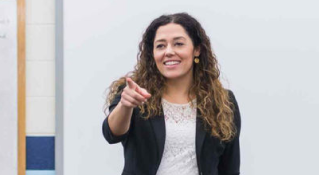
Explore 5 potential careers in education
A career in education is both practical and fulfilling, and there is a wide range of professional options. If youâre thinking about a career as an educator, start your exploration here.

6 key areas of expertise needed to become a master teacher
Are advanced teaching skills in your plans for the future? Hereâs how to think about â and plan for â getting the education you need for your career goals.

5 reasons to incorporate technology into the classroom
Concerned that tech is just a distraction in the classroom? It doesnât have to be. Explore the upside of how technology can enhance learning.
Ready for the next step?
Learning online doesnât mean going it alone. Help is here, from enrollment assistance and counselors to faculty and academic coaches. Plus, youâll have a supportive community of students who are as passionate about their careers as you are about yours.
Please Exit Private Browsing Mode
Your internet browser is in private browsing mode. Please turn off private browsing mode if you wish to use this site.
Are you sure you want to cancel?

Master of Education Program
Elevate your teaching career with SMU's Master of Education program. Gain specialized skills in key areas like ESL, Special Education, or Urban Education and become a leader in educational excellence. Start your journey today and transform your passion for teaching into expertise.
public and private schools in Texas
ranking among private graduate schools of education nationally
To kickstart a transformational journey in education, consider SMU's Master of Education program, crafted for aspiring educators committed to making a difference. With flexible specialization tracks in ESL, Special Education, and Urban Education, our program is designed to adapt to your career goals and schedule. Dive into a curriculum that merges theoretical knowledge with practical application, preparing you to meet today's educational challenges with innovative solutions.
By requesting information, you take the first step towards enhancing your educational expertise and leadership skills. This program not only focuses on improving your teaching techniques but also equips you with the tools to influence positive change in educational settings. Connect with a community of dedicated educators and start shaping the future of education today. Unlock exclusive insights into our program and discover how SMU can help elevate your teaching career to new heights.

Request information
Explore our programs.

While our master’s degree programs incorporate various specializations, we also offer non-degree specialization and certification-preparation programs that are designed to satisfy the State Board for Educator Certification’s requirements in specific educational areas. The additional specialization training prepares teachers for the respective certification exams; all SBEC certifications require that a candidate pass a state test.
These advanced credentials are attached to the standard teaching certificate, so as a prerequisite to earning a graduate certification, a candidate must already hold a bachelor's degree and the initial teaching certificate. This degree program is designed for completion within two years. All program requirements for the graduate degree must be completed within six years.
The Urban Education program is designed for teachers of diverse student populations who wish to cultivate more culturally responsive classrooms. Educators explore the historical context of urban education and learn how culturally responsive curricula increase student outcomes, reduce student behavioral infractions, and enhance teacher-student relationships. The 4-course sequence can be taken as standalone professional development. The program's coursework can be applied toward SMU's M.Ed. degree.
The ESL specialization is for practicing educators interested in working with ESL populations. Graduates are prepared to take the TExES (Texas Examination for Educator Standards) English as a Second Language (ESL) supplemental certification exam, a passing score on which qualifies them to work with ESL students populations. The program's coursework can be applied toward SMU's M.Ed. degree.
The Bilingual specialization is designed for teachers who work with students who do not speak English as their native language. Students who succeed in this four-course sequence are qualified to take the TExES (Texas Examination for Educator Standards) supplemental certification exam in bilingual education, a passing score on which qualifies them to work with students who do not speak English as their native language. The program's coursework can be applied toward SMU's M.Ed. degree.
The Special Education specialization is for practicing educators interested in working with students with special needs. Content mastery equips graduates to work with special-needs students; they are able to employ evidence-based practices, monitor response to intervention, individualize intervention based on assessed needs, understand special education law and policy, deliver positive-behavior support, and collaborate with the colleagues and families of special-needs individuals. The program's coursework can be applied toward SMU's M.Ed. degree.
The Mathematics specialization is for practicing educators who wish to advance their content knowledge or pedagogical skills for the purpose of teaching mathematics. Those who successfully complete the 4-course sequence will have to the skills and knowledge to model effective mathematics instruction, translate evidence-based research into classroom teaching, differentiate with diverse learners, and instill creative problem solving. The program’s coursework can be applied to SMU’s M.Ed. degree.
The Literacy Studies specialization is ideal for teachers who desire to advance their knowledge of literacy instruction and assessment specifically for early literacy and late literacy and for those who desire to pursue Reading Specialist certification. Those who successfully complete the program will be more effective teachers, improving student outcomes in literacy. The program's coursework can be applied toward SMU's M.Ed. degree.
The STEM specialization is designed for practicing educators who wish to advance their content knowledge or pedagogical skills for the purpose of teaching science, technology, engineering, and mathematics content. Those who successfully complete the program are equipped to be more effective STEM educators. The program's coursework can be applied toward SMU's M.Ed. degree.
The Educational Diagnostician specialization is designed for practicing educators who who desire to possess the critical knowledge and skills to identify and make a positive impact on the individual learning needs of students. Those who successfully complete the program will be able to apply their advanced knowledge of assessment and instruction to improve the outcomes of students with special learning needs. After successful completion of the program as part of an M.Ed. degree, candidates will be eligible for the Texas Educational Diagnostician Certificate.
The Learning Therapy specialization is ideal for individuals interested in working with children or adults who have dyslexia or related language learning disorders. Those who successfully complete the specialization are qualified to take the Alliance National Registration Exam for Multisensory Structured Language Education at the therapy level, a passing score on which qualifies the individual for membership in ALTA as a Certified Academic Language Therapist (CALT). The program's coursework can be applied toward SMU's M.Ed. degree.
Primary navigation menu
Search the smu website, popular searches.
- Current Students
- Undergraduate Admission
- Graduate Admission
- Faculty & Staff
- Majors & Minors
- Graduate School
COVID-19 Information (Mustang Strong)
Did you know?
SMU's singular approach to integrating rigorous learning with hands-on experience will prepare you to achieve your educational goals and expand your world in ways you never imagined. Ours is a community of people forging their own paths. We'd like to help you shape yours.

IMAGES
VIDEO
COMMENTS
Learn about the online doctorate in special education, a degree that prepares graduates for various teaching and leadership careers in the field of special needs education. Compare Ph.D. and Ed.D. programs, concentrations, accreditation, admission requirements, and career paths.
Earn a doctoral degree in special education online and prepare for leadership roles in education or behavioral fields. Choose from five focused areas of study and complete a dissertation with a doctoral committee.
Learn how to become a leader and researcher in special and inclusive education with a Ph.D. from Syracuse University. Explore the program requirements, concentrations, scholarships, and student dissertations.
Learn about online doctorate in special education programs, admission requirements, career prospects, and rankings. Compare schools and find out how to earn your doctorate in special education online.
Learn how to conduct research and teach in special education with a Ph.D. from Peabody College. Explore the program facts, specializations, faculty, and application process.
Earn a doctoral degree in special education online from a Christian university with a biblical worldview. Learn how to help students with disabilities excel in the classroom and beyond with research methods and evidence-based practices.
Learn how to lead the way in creating an equitable and inclusive education system with a doctoral degree in special education from GW. Explore the curriculum, faculty, admissions, and career opportunities in this cross-disciplinary program.
A master's degree is required for admission into most special education doctoral programs online, and some will only accept students with a minimum master's GPA of 3.0 to 3.25.
Earn a professional practice doctorate in special education online from UF, a program inspired by the Carnegie Project on the Education Doctorate. Learn from globally acclaimed faculty and engage with your professional practice and the broader context of your work.
The Special Education Doctoral Program is more than a traditional Ph.D. It's a transformative journey designed to create special education leaders who bring systemic change to educational and community settings. With a strong focus on inclusive education, we will prepare you with the skills, knowledge and relationships needed to drive ...
The Doctor of Education (EdD) with a specialization in Special Education (Non-Licensure) can position you to advance in this growing field. Educators with advanced degrees in special education are the leaders in school districts, communities, institutions of higher education, and the profession. Coursework in this program focuses on your ...
Our Doctor of Education (EdD) in Special Education is designed to help you become well-equipped to communicate through various mediums, critically problem-solve, and increase information literacy ...
The doctorate in Special Education and Disability Studies focuses on issues of disability as they apply to schools, with a focus on teacher preparation.
The online Doctorate of Education (Ed.D.) in Special Education at the University of Florida is a CPED-influenced professional practice doctorate designed to develop expert ... Program faculty review applications and make admissions decisions based on the degree to which applicants' qualifications and educational goals match our mission ...
The JOINT Doctoral Program in Special Education prepares leaders in research, teaching, administration, and supervision for the variety of professional needs facing children, youth, and adults with disabilities. It integrates the resources of UC Berkeley and San Francisco State University (SFSU) and provides an opportunity for students to combine theoretical interests with applied practices in ...
7. Gwynedd Mercy University. Gwynedd Mercy University offers a quick and flexible way to earn a doctoral degree with its 54 credit, online, accelerated Executive Doctorate in Educational Leadership program. Students can choose from four concentrations, including one in Leadership in Special Education.
Graduate Program: Special Education DEGREES. UCLA's Graduate Program in Special Education offers the following degree(s): D. Doctor of Philosophy (Ph.D.) ... Special Education Graduate Program at UCLA 1009 Moore Hall Box 951521 Los Angeles, CA 90095-1521. FACULTY. Visit the Special Education's faculty roster.
A doctoral degree in Special Education prepares individuals to become. ... Special Education doctoral students follow a competency-based program of study individualized for each student's professional goals and research interests. Students have opportunities that include (but are not limited to): engaging in research projects, teaching ...
The PhD program in Special Education is designed to prepare leaders in research, teaching and service for faculty positions in colleges and universities and for other positions in behavioral clinics or agencies in the communities. In our accredited program, you will develop competencies in conducting research, writing for scholarly publications ...
This online doctorate of special education degree was created to train students with the specific skills needed to work with young special needs students. After completing this program of study, students will be able to step into administrative and leadership roles. Within these roles, students will be able to develop programming designed to ...
Degree Prep. A graduate degree in special education is ideal for people who have compassion and a desire to help those with special needs. A graduate degree places the student in leadership and decision-making roles. An undergraduate degree in education or a similar field is required for the special education program.
Graduate tuition is charged per credit hour, unless otherwise noted. Rates vary by program and location. The tuition rate* for the off-campus EdS in SpEd Leadership program is $970 per credit hour. The tuition rate* for the online EdS in SpEd Leadership program is $1,000 per credit hour. This program requires 30 credits.
Fulfilling the prerequisites for special education certification mandates a robust educational foundation: Educational Background: Complete a bachelor's degree from an accredited institution with an approved teacher preparation program. You may need to include official transcripts with your job applications 9.
However, people with a doctoral degree earned much more, with a median annual salary of around $108,000. This means doctorate-holders earn about $22,000 more each year than those with master's degrees — and a whopping $34,000 more than those with bachelor's degrees. Frequently Asked Questions About Online Ph.D. Programs and Doctorates
The Special Education Master's Degree and Certification-Only Program at the University of Idaho is designed to offer certified teachers a convenient pathway to obtain a master's degree in special education, coupled with the option of special education certification. Our program stands out as a top choice for students seeking distance ...
• Doctoral degree in special education, vocational rehabilitation counseling, counseling psychology, psychology, social work, education, or a related field (conferred by position start date). • At least 2-years of experience working with students and/or young adults with disabilities, including those with intellectual and/or developmental
An education degree helps prepare you to build a fulfilling career, shaping learning experiences, fostering inclusivity, driving change in education and more. MS in Education: With Capella Tuition Cap, you won't pay more than $12,000 in tuition costs for your degree. EdD in Education: With Capella Tuition Cap, you won't pay more than ...
The Education Specialist (EdS) program emphasizes an applied, project-based approach to development of appreciable improvements in the body of educational practice. The EdS attracts individuals who are primarily professionals either at the PK-12 level or the higher education level. (Enrollment managers, superintendents, principals, teacher ...
This degree program is designed for completion within two years. All program requirements for the graduate degree must be completed within six years. Advance your teaching career with SMU's Master of Education program. Specialize in ESL, Special Education, Urban Education, and more. Designed for completion within two years, our program equips ...
This unique B.S. in Childhood Education/Early Childhood Education/Special Education allows students to complete their undergraduate degree and become eligible for New York state initial certification in grades B-6 classroom and for all grades in special education. Russell Sage College has prepared educators for more than 100 years, and our name ...